All reports
Huntington's disease
·
Jan 30, 2025
Understanding Huntington’s disease: a guide for patients
Causes, symptoms, progression, treatment options, and support resources
Reports are in beta and continually improving. They are not a substitute for professional medical advice. Please contact us to give feedback.
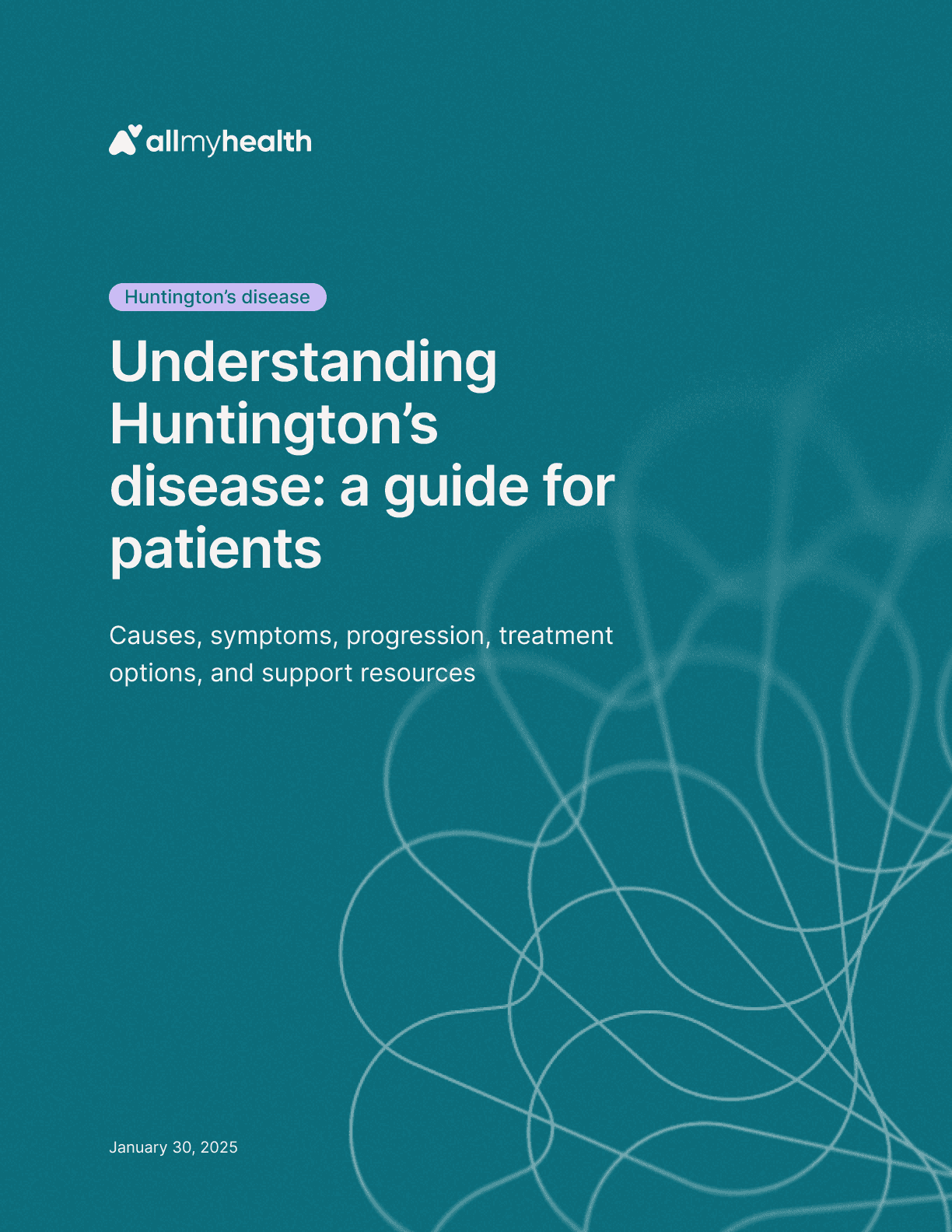
Stay informed
This report was published in our weekly newsletter and on our community page. Follow to stay up to date with the latest news and research relevant to your condition.
Listen to the audio version
Introduction
Navigating the world of Huntington's disease can be challenging, especially when faced with unfamiliar medical terms. This guide aims to break down some of the common terms associated with HD in a clear and accessible way, empowering you with knowledge and understanding.
What is Huntington's Disease?
Huntington's disease (HD) is an inherited disorder that causes the progressive breakdown of nerve cells in the brain [1]. This breakdown affects movement, cognition (thinking), and emotions. Onset is usually in mid-life, but can occur anytime from childhood to old age [2]. The initial signs of this disorder may be subtle [2]. HD is characterized by a movement disorder, dementia, and psychiatric disturbances [2].
Genetic Testing and Counseling
If you have a family history of HD, genetic testing can help determine if you have inherited the gene that causes the disease [3]. Genetic counseling is crucial to help you understand the implications of genetic testing, including the emotional and social impact of a diagnosis [4].
Stages of Huntington's Disease
The progression of HD varies from person to person, but it can generally be divided into stages with different symptoms and challenges: [2]
Early Stage
Description: Individuals can still perform most of their usual activities, including working and driving.
Typical Symptoms:
Mild and infrequent involuntary movements.
Clear speech.
Mild or no dementia.
Challenges:
Subtle changes in mood, coordination, and thinking abilities.
Middle Stage
Description: Patients are more disabled and may need assistance with some daily activities.
Typical Symptoms:
Falls, weight loss, and swallowing difficulties.
More pronounced involuntary movements.
Dementia becomes more obvious.
Challenges:
Increased difficulty with daily tasks, work, and social interactions.
Late Stage
Description: Patients require almost total care and may reside in hospitals, nursing homes, or at home with significant support.
Typical Symptoms:
May no longer have the ability to walk or speak.
May be more rigid with fewer involuntary movements.
May lose the ability to swallow food.
Challenges:
Complete dependence on others for care.
It's important to remember that this is a general overview, and the specific symptoms and progression of HD can vary significantly from person to person.
Common Medical Terms
Here are some common medical terms you might encounter when learning about HD:
Chorea: This refers to the involuntary, jerky movements that are a hallmark of HD. These movements can affect the face, limbs, and torso, making everyday tasks like walking, eating, and speaking more challenging [1].
Bradykinesia: This term describes slowness of movement. While chorea is more common, some individuals with HD may experience slowed movements instead of or in addition to chorea [5].
Dystonia: Dystonia involves involuntary muscle contractions that cause twisting and repetitive movements or abnormal postures [1].
Akinesia: This refers to a lack of movement or an inability to initiate movement. Some people with HD may experience akinesia, particularly as the disease progresses [1].
Dementia: Dementia is a decline in thinking abilities, including memory, problem-solving, and decision-making. It can affect daily functioning and independence [1].
Psychosis: Psychosis involves a loss of contact with reality, which may include hallucinations (seeing or hearing things that aren't there) and delusions (false beliefs) [1].
CAG Repeats: The HTT gene, which is responsible for HD, contains a sequence of three DNA building blocks (cytosine, adenine, and guanine) that repeat multiple times. This is called a CAG trinucleotide repeat. In people with HD, this CAG segment is repeated more times than usual, leading to the production of an abnormal protein that damages brain cells [4]. The number of CAG repeats can influence the age of onset and the severity of symptoms [7].
Huntington's Disease-like Syndromes
There are other conditions that may have similar symptoms to HD. These are sometimes called "Huntington's disease-like syndromes." It's important to remember that these are distinct conditions with their own causes and characteristics.
Here are a few examples: [9]
Chorea-acanthocytosis: This is a rare genetic disorder that causes a variety of neurological symptoms, including involuntary movements, personality changes, and cognitive decline.
McLeod syndrome: This is a genetic disorder that affects red blood cells and can also cause neurological symptoms like movement disorders and cognitive impairment.
Pantothenate kinase-associated neurodegeneration: This is a rare genetic disorder that causes iron to build up in the brain, leading to movement problems, dystonia, and other neurological symptoms.
Wilson disease: This is a genetic disorder that causes copper to accumulate in the body, leading to liver problems and neurological symptoms like tremors, dystonia, and difficulty with coordination.
Huntington disease-like 1 and 2: These are rare genetic disorders that have similar symptoms to HD, including chorea, dementia, and psychiatric disturbances.
Spinocerebellar ataxia type 17: This is a genetic disorder that affects coordination and balance and can also cause cognitive decline and psychiatric symptoms.
Dentatorubral-pallidoluysian atrophy: This is a rare genetic disorder that causes a variety of neurological symptoms, including involuntary movements, speech problems, and cognitive decline.
How does Huntington's Disease affect daily life?
Huntington's disease can significantly impact daily life, affecting physical abilities, cognitive function, and emotional well-being [1].
Physical Challenges:
Movement Disorders: Chorea, dystonia, and other movement disorders can make it difficult to walk, maintain balance, and perform fine motor tasks like buttoning clothes or using utensils [1].
Speech and Swallowing: HD can affect the muscles involved in speech and swallowing, leading to slurred speech, difficulty communicating, and problems with eating and drinking [12]. This can also increase the risk of choking and aspiration pneumonia [12].
Cognitive Challenges
Thinking and Memory: HD can cause problems with concentration, memory, and decision-making [10]. This can affect work, school, and daily activities like managing finances or following instructions.
Planning and Organization: Individuals with HD may have difficulty with planning, organization, and multitasking [11]. This can make it challenging to complete tasks, manage time, and stay organized.
Emotional and Social Challenges
Mood Swings and Irritability: HD can cause mood swings, irritability, and increased aggression [12]. This can affect relationships with family and friends and make social interactions more difficult.
Depression and Anxiety: Depression is a common symptom of HD, and it's important to seek professional help if you're experiencing feelings of sadness, hopelessness, or loss of interest in activities [11]. Anxiety and social withdrawal are also common [1].
Coping with Huntington's Disease
While there is currently no cure for HD, there are ways to manage the symptoms and improve quality of life [14].
Medication
Movement Disorders: Medications like tetrabenazine and deutetrabenazine can help reduce chorea and other involuntary movements [14].
Mental Health: Antidepressants, antipsychotics, and mood stabilizers can be used to manage depression, anxiety, and other mental health conditions associated with HD [14].
Therapy
Physical Therapy: Physical therapy can help improve strength, flexibility, balance, and coordination, which can help maintain mobility and reduce the risk of falls [14].
Occupational Therapy: Occupational therapists can help individuals with HD adapt to their changing abilities and find ways to continue participating in meaningful activities [14]. They can also provide strategies for managing daily tasks and making the home environment safer.
Speech Therapy: Speech therapy can help with communication difficulties, including slurred speech and swallowing problems [12].
Psychotherapy: Psychotherapy can provide support and coping strategies for individuals and families affected by HD [14].
Lifestyle Adjustments
Exercise: Regular exercise can help improve physical and mental well-being [3]. It can also help reduce stress, improve mood, and potentially slow the progression of HD.
Healthy Diet: A healthy diet is important for overall health and well-being [15]. Individuals with HD may need to adjust their diet to manage weight loss or swallowing difficulties [3].
Stress Management: Stress can worsen HD symptoms, so finding healthy ways to manage stress is important [15]. This may include relaxation techniques, mindfulness, or spending time in nature.
Support Systems
Support Groups: Support groups can provide a safe and supportive space to connect with others who understand the challenges of living with HD [14].
Family and Friends: The support of family and friends is crucial for individuals with HD [15]. Open communication and understanding can help everyone cope with the emotional and social impact of the disease.
Clinical Trials and Research
Researchers are constantly working to find new treatments for HD. Clinical trials are an important part of this process, as they allow scientists to test the safety and effectiveness of new therapies [16].
Current Research
Gene Therapy: Some clinical trials are exploring gene therapy approaches to target the underlying genetic cause of HD [17].
Drug Therapies: Other trials are investigating new drugs that may slow the progression of HD or improve symptoms [18].
Symptom Management: Some trials focus on improving the management of specific symptoms, such as movement disorders or cognitive decline [19].
Finding Clinical Trials
HD Trial Finder: The Huntington's Disease Society of America (HDSA) offers an HD Trial Finder tool to help you find clinical trials in your area [16].
ClinicalTrials.gov: This website provides information about clinical trials for a variety of conditions, including HD [3].
Global Resources and Support
There are many organizations and resources available to support individuals and families affected by HD worldwide.
Organizations
Huntington's Disease Society of America (HDSA): This organization provides information, support, and advocacy for people with HD and their families [3].
International Huntington Association (IHA): This is a global federation of organizations that support people with HD [20].
Huntington's Disease Youth Organization (HDYO): This organization provides support and resources specifically for young people affected by HD [21].
Websites and Online Resources
HD Buzz: This website provides HD research news in simple language [21].
HOPES: This website, run by Stanford University, offers information and resources about HD [3]
Living with Huntington's Disease
Living with Huntington's disease can be challenging, but it's important to remember that you are not alone. By understanding the medical terminology, staying informed about the disease, and seeking support from healthcare professionals, family, and friends, you can navigate the challenges of HD and live a fulfilling life. Remember to prioritize your well-being, both physically and emotionally, and consider participating in research to contribute to the search for new treatments and a cure.
References
Huntington's Disease | National Institute of Neurological Disorders
https://www.ninds.nih.gov/health-information/disorders/huntingtons-disease
About Huntington's Disease and Related Disorders | Johns Hopkins Medicine
https://www.hopkinsmedicine.org/psychiatry/specialty-areas/huntingtons-disease/patient-family-resources/education-whatis
Huntington's Disease - Family Caregiver Alliance
https://www.caregiver.org/resource/huntingtons-disease/
Genetics of Huntington's Disease
https://www.hda.org.uk/professionals-and-training/about-huntingtons-disease/genetics-of-huntingtons-disease/
Huntington's Disease - UTMB Health, The University of Texas Medical Branch
https://www.utmb.edu/neuro/clinical-enterprises/specialty-clinics/huntington's-disease
Huntington's Disease: MedlinePlus Genetics
https://medlineplus.gov/genetics/condition/huntingtons-disease/
The Huntington Gene - UC Davis Huntington's Disease Center of Excellence
https://health.ucdavis.edu/huntingtons/genetic-change.html
Slightly Long CAG Repeats Are More Common Than We Thought - HDBuzz
https://en.hdbuzz.net/222
Huntington Disease - StatPearls - NCBI Bookshelf
https://www.ncbi.nlm.nih.gov/books/NBK559166/
Huntington's Disease | Johns Hopkins Medicine
https://www.hopkinsmedicine.org/health/conditions-and-diseases/huntingtons-disease
Huntington's Disease - Symptoms and Causes - Mayo Clinic
https://www.mayoclinic.org/diseases-conditions/huntingtons-disease/symptoms-causes/syc-20356117
Huntington's Disease | NHS Inform
https://www.nhsinform.scot/illnesses-and-conditions/brain-nerves-and-spinal-cord/huntingtons-disease/
Huntington's Disease - Symptoms - NHS
https://www.nhs.uk/conditions/huntingtons-disease/symptoms/
Huntington's Disease - Diagnosis and Treatment - Mayo Clinic
https://www.mayoclinic.org/diseases-conditions/huntingtons-disease/diagnosis-treatment/drc-20356122
Huntington's Disease: Symptoms, Treatment, and Hope - HelpGuide.org
https://www.helpguide.org/aging/dementia/huntingtons-disease
Enroll in a Clinical Trial - Huntington's Disease Society of America
https://hdsa.org/hd-research/enroll-in-a-clinical-trial/
Research Program | Johns Hopkins Medicine
https://www.hopkinsmedicine.org/psychiatry/specialty-areas/huntingtons-disease/research
5 Huntington's Therapies to Watch - BioSpace
https://www.biospace.com/drug-development/5-huntingtons-therapies-to-watch
Clinical Trial for Huntington Disease (HD) - Genentech
https://genentech-clinicaltrials.com/en/trials/neurodegenerative-disorder/hd/a-study-to-evaluate-the-safety--biomarkers--and-efficac-41200.html
International Huntington Association - National Organization for Rare Disorders
https://rarediseases.org/organizations/international-huntington-association/
Resources for Huntington's Disease Patients and Their Families - Massachusetts General Hospital
https://www.massgeneral.org/neurology/treatments-and-services/huntingtons-resources

Gaucher disease
·
Inclusion of Gaucher disease in newborn screening panels across the U.S.
Apr 9, 2025

Hemophilia
·
Qfitlia: A breakthrough in hemophilia treatment
Apr 3, 2025

Multiple myeloma
·
Navigating clinical trials in multiple myeloma
Apr 2, 2025

Gene and cell therapy
·
An introduction to cell therapy
Mar 25, 2025

Gene and cell therapy
·
An introduction to gene therapy
Mar 19, 2025
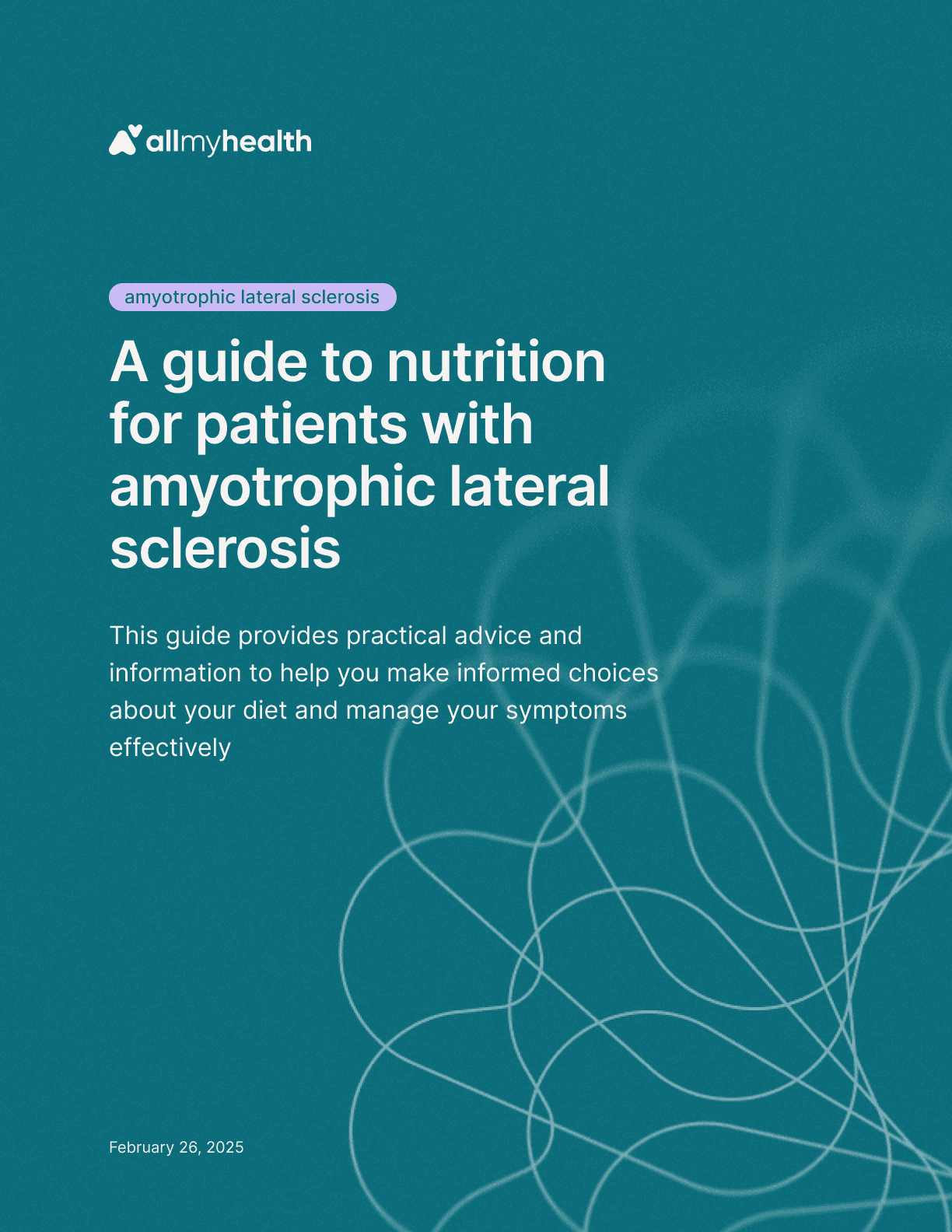
Amyotrophic lateral sclerosis
·
A guide to nutrition for patients with amyotrophic lateral sclerosis
Feb 26, 2025
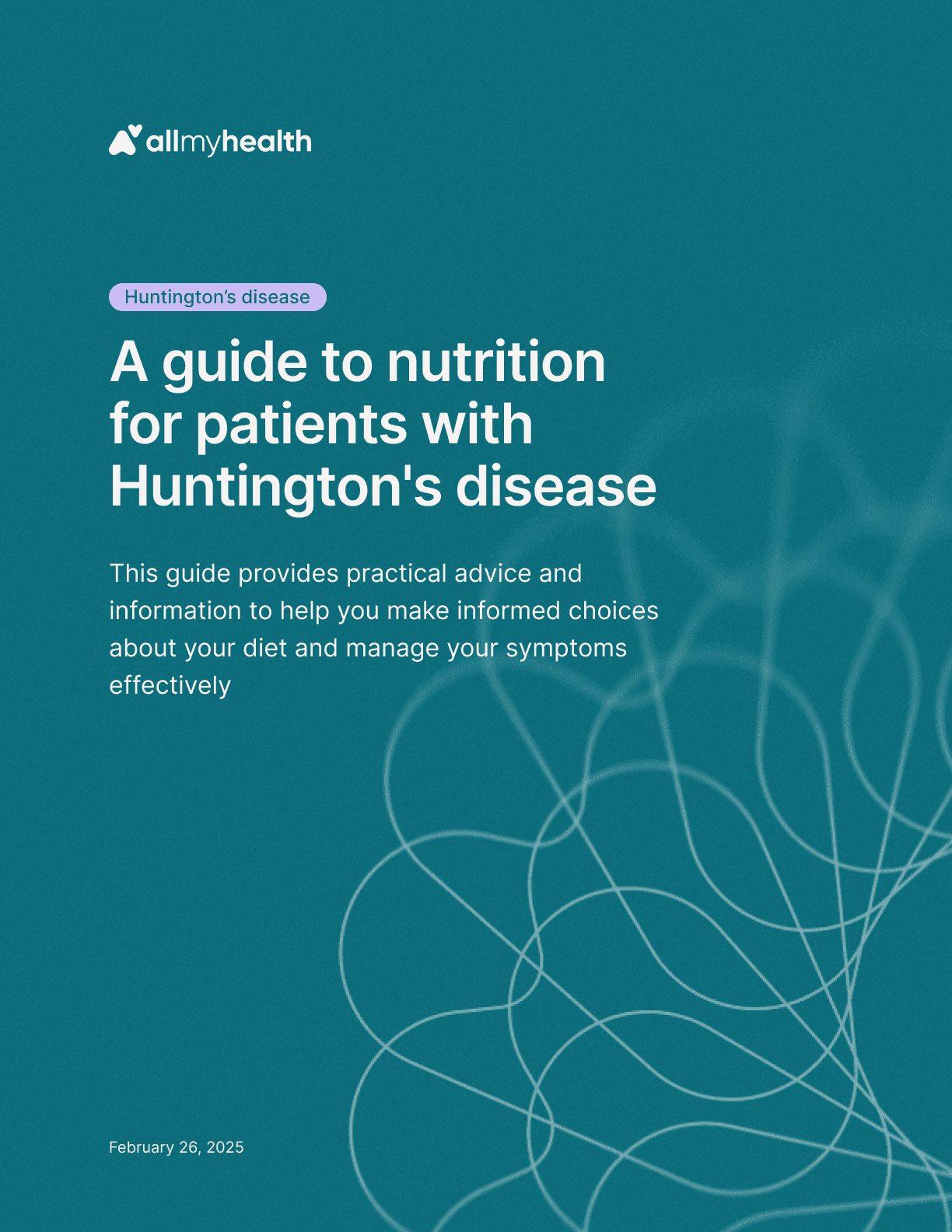
Huntington's disease
·
A guide to nutrition for patients with Huntington's disease
Feb 26, 2025

Spinal muscular atrophy
·
A guide to nutrition for patients with spinal muscular atrophy
Feb 26, 2025
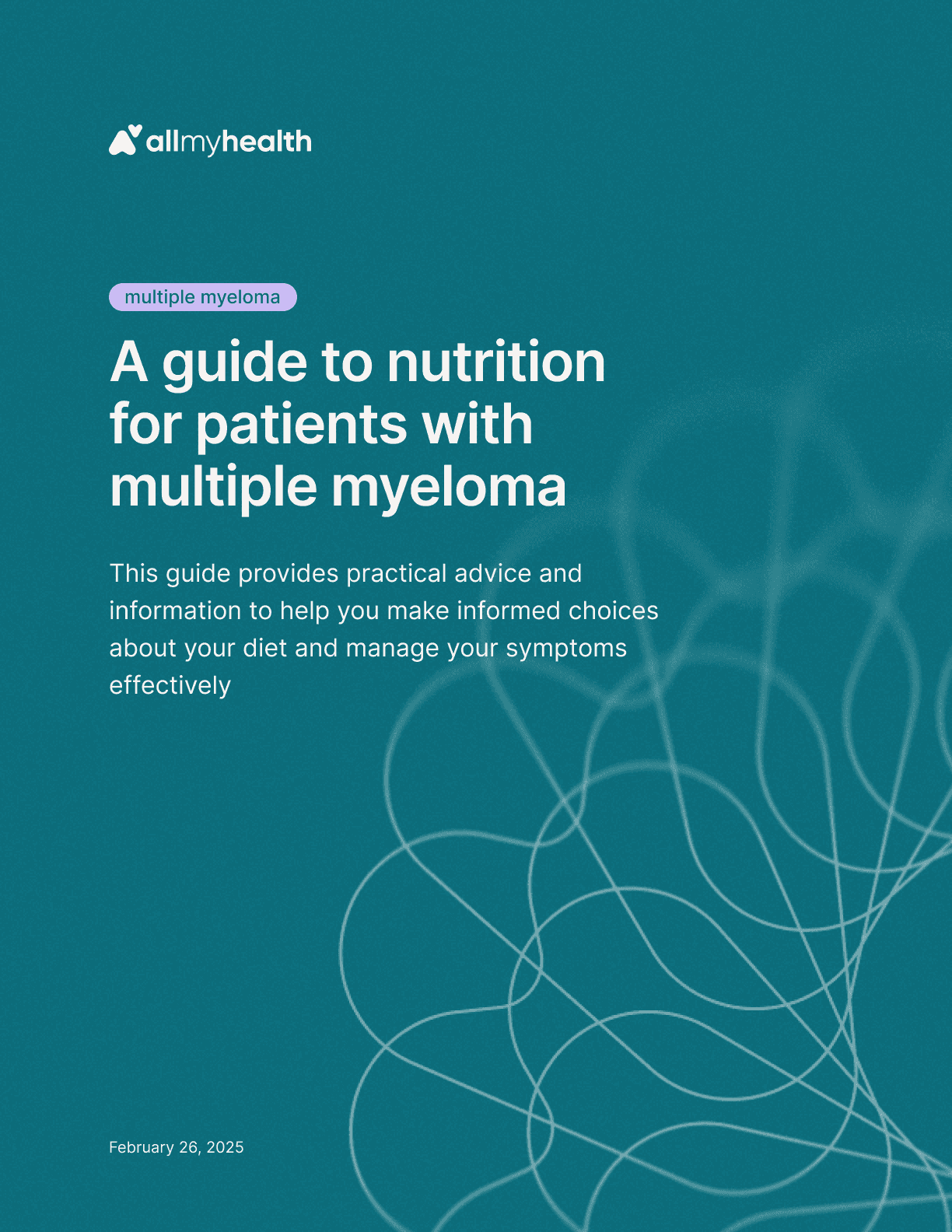
Multiple myeloma
·
A guide to nutrition for patients with multiple myeloma
Feb 26, 2025
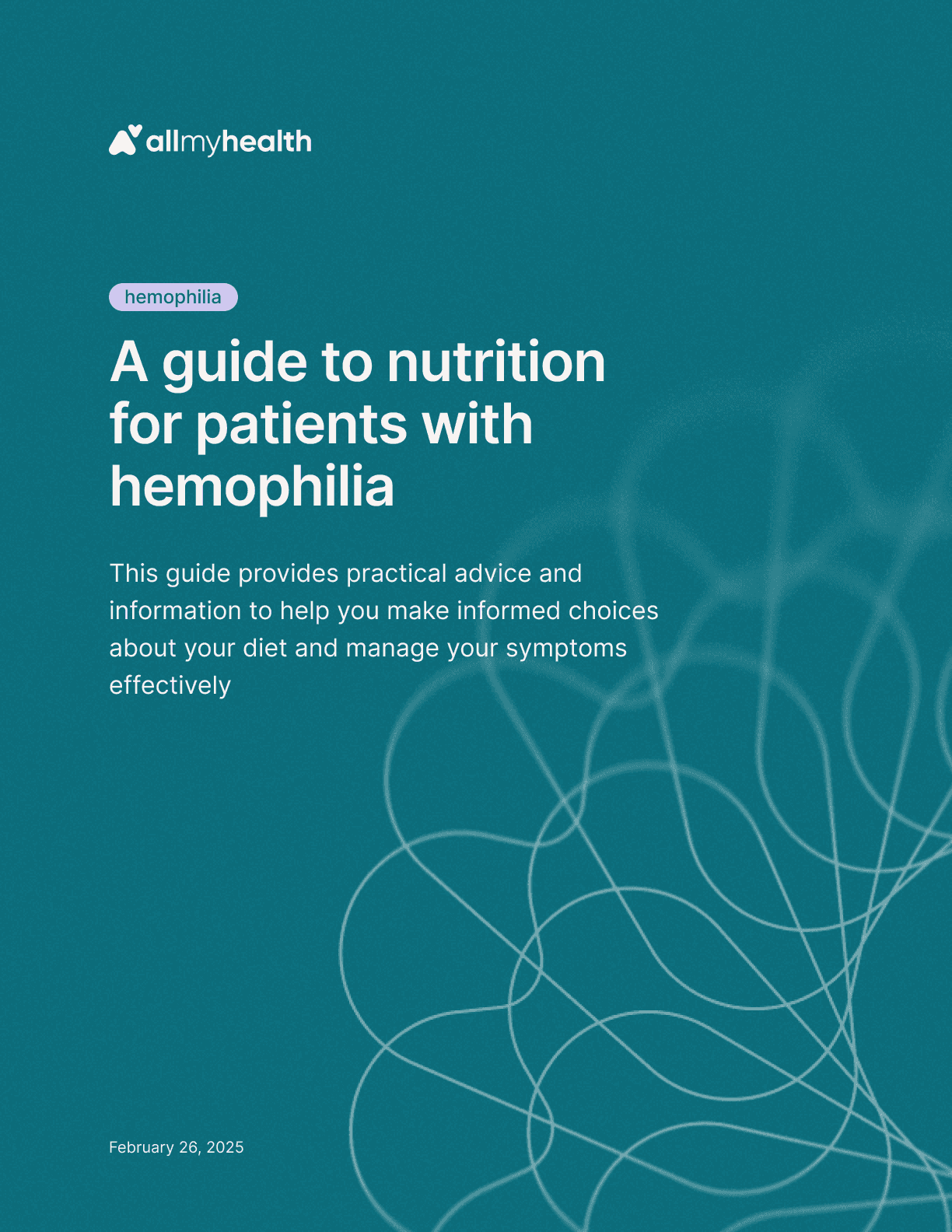
Hemophilia
·
A guide to nutrition for patients with hemophilia
Feb 26, 2025
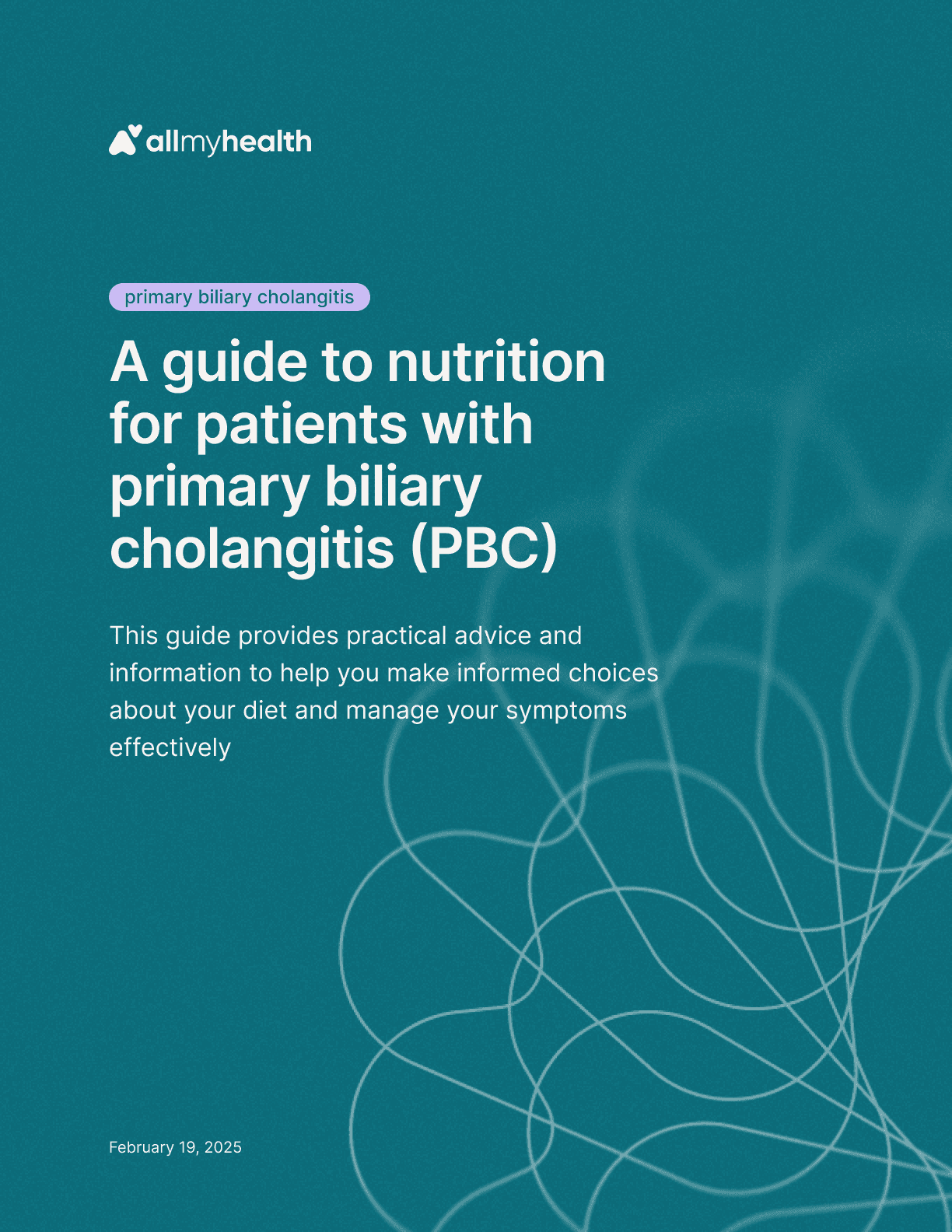
Primary biliary cholangitis
·
A guide to nutrition for patients with primary biliary cholangitis (PBC)
Feb 19, 2025
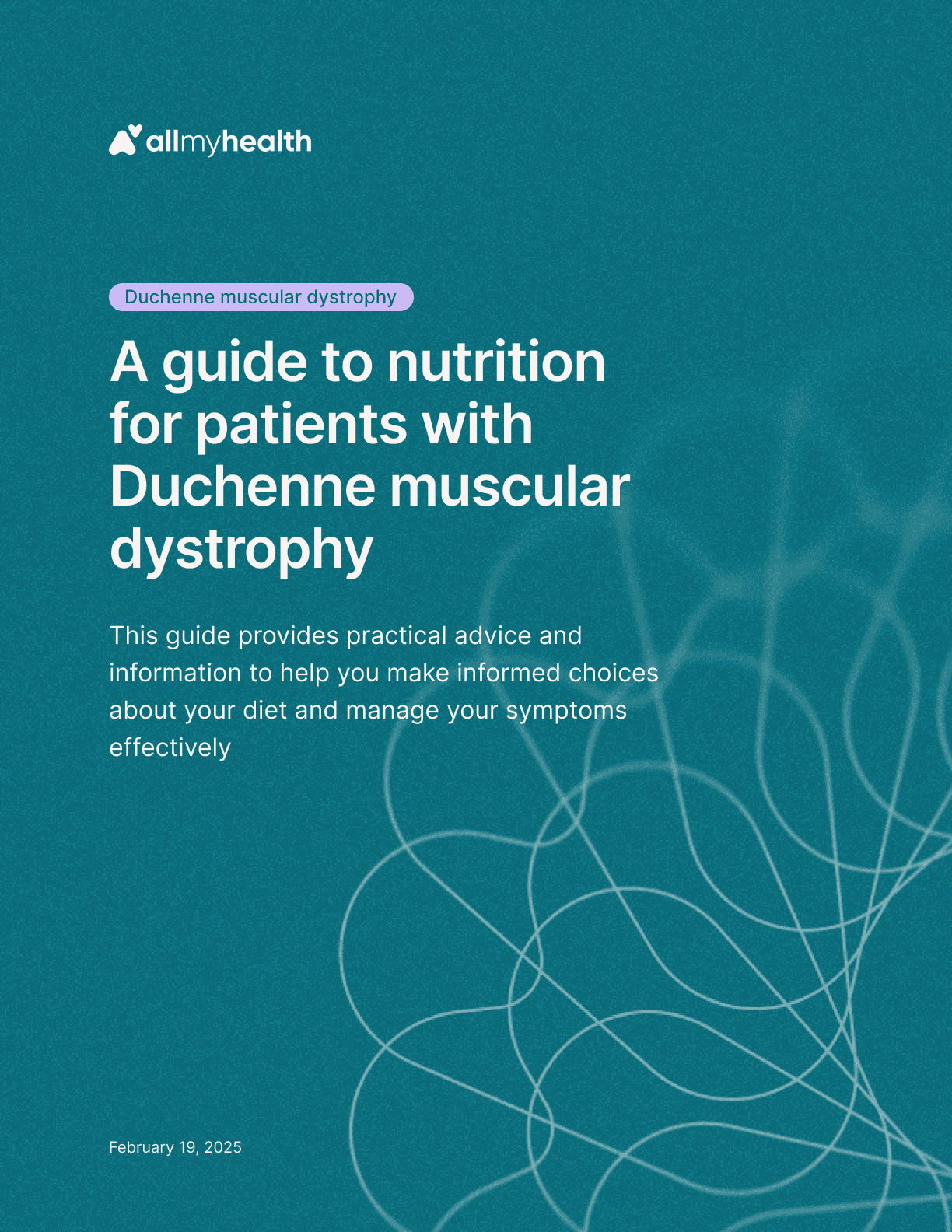
Duchenne muscular dystrophy
·
A guide to nutrition for patients with Duchenne muscular dystrophy
Feb 19, 2025
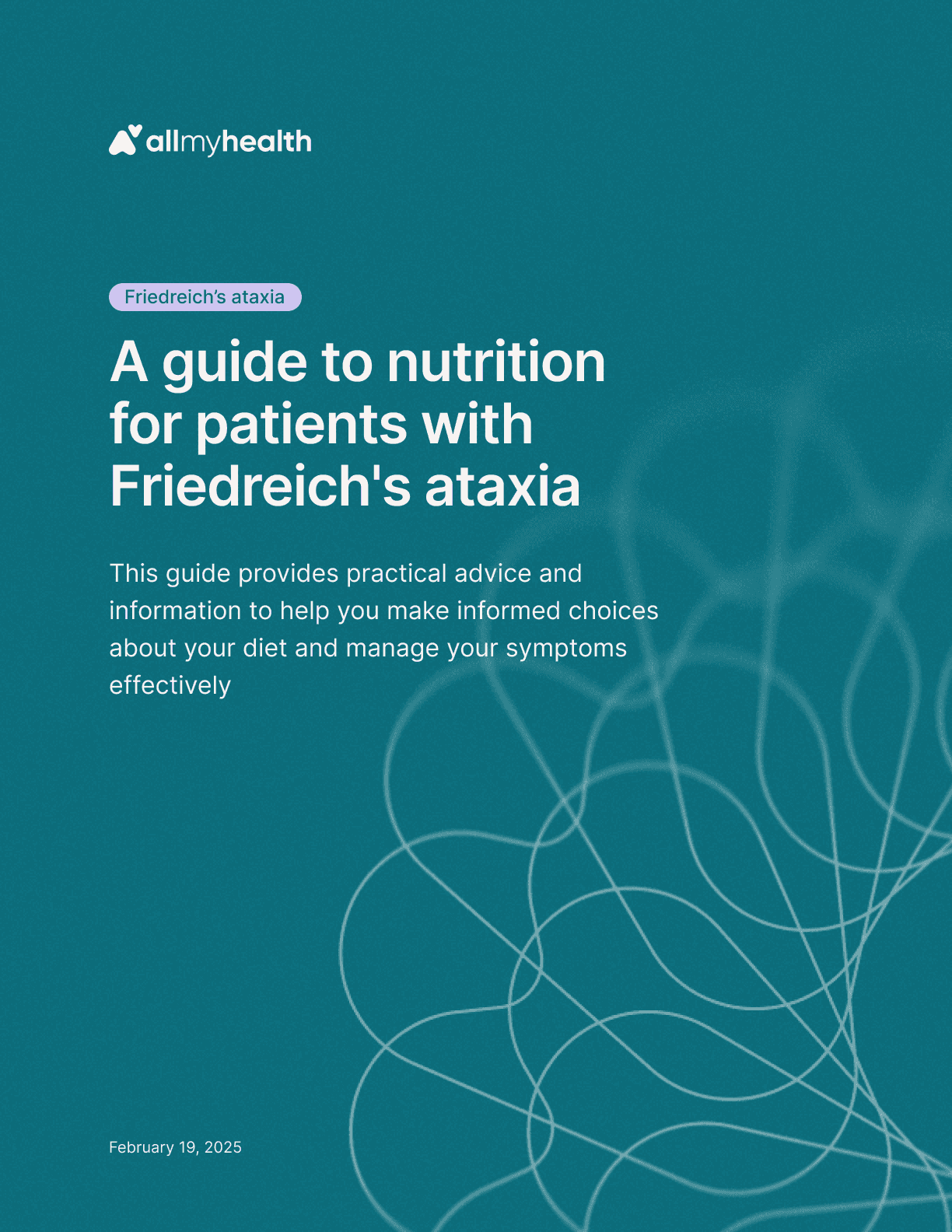
Friedreich's ataxia
·
A guide to nutrition for patients with Friedreich's ataxia
Feb 19, 2025
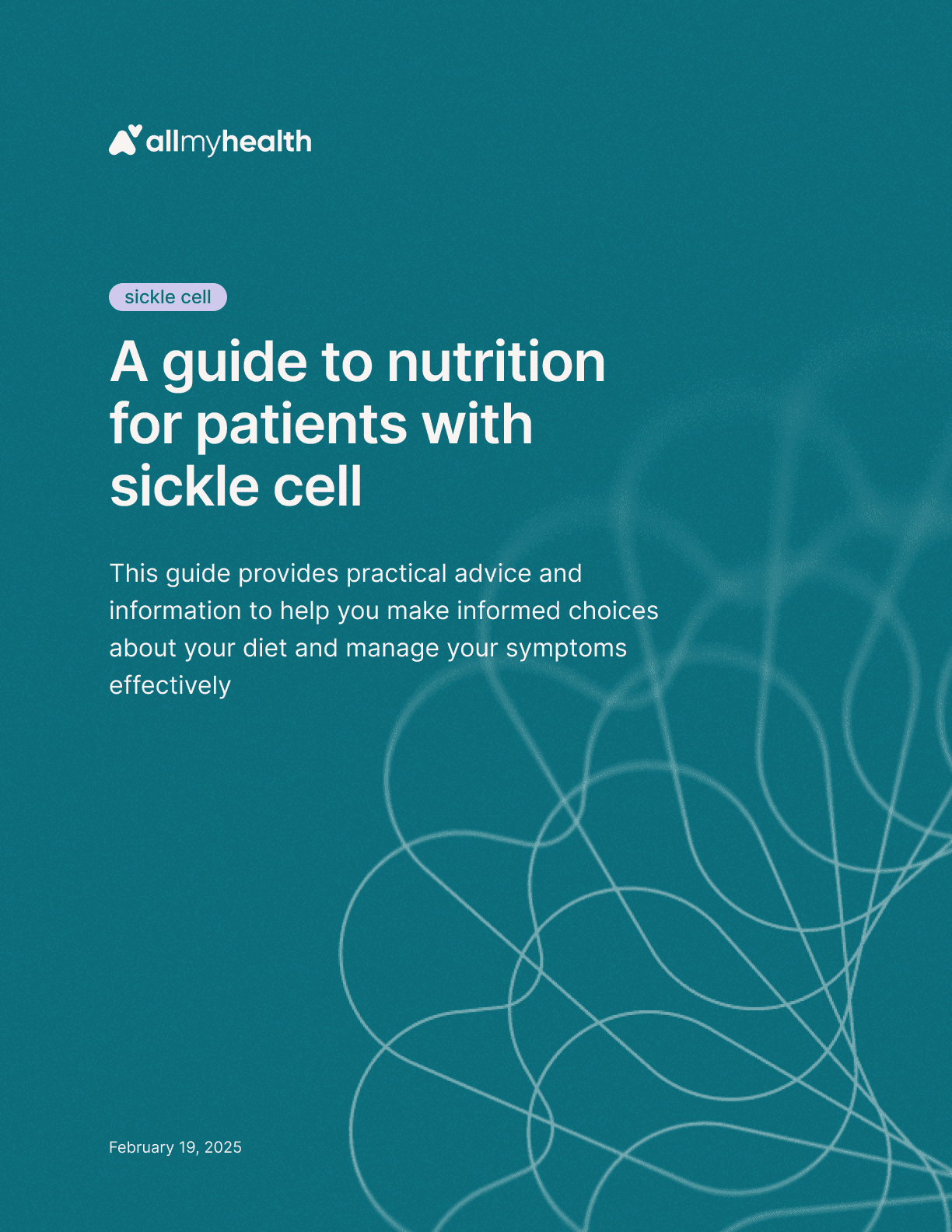
Sickle cell
·
A guide to nutrition for patients with sickle cell
Feb 19, 2025

Mantle cell lymphoma
·
A guide to nutrition for patients with mantle cell lymphoma
Feb 19, 2025
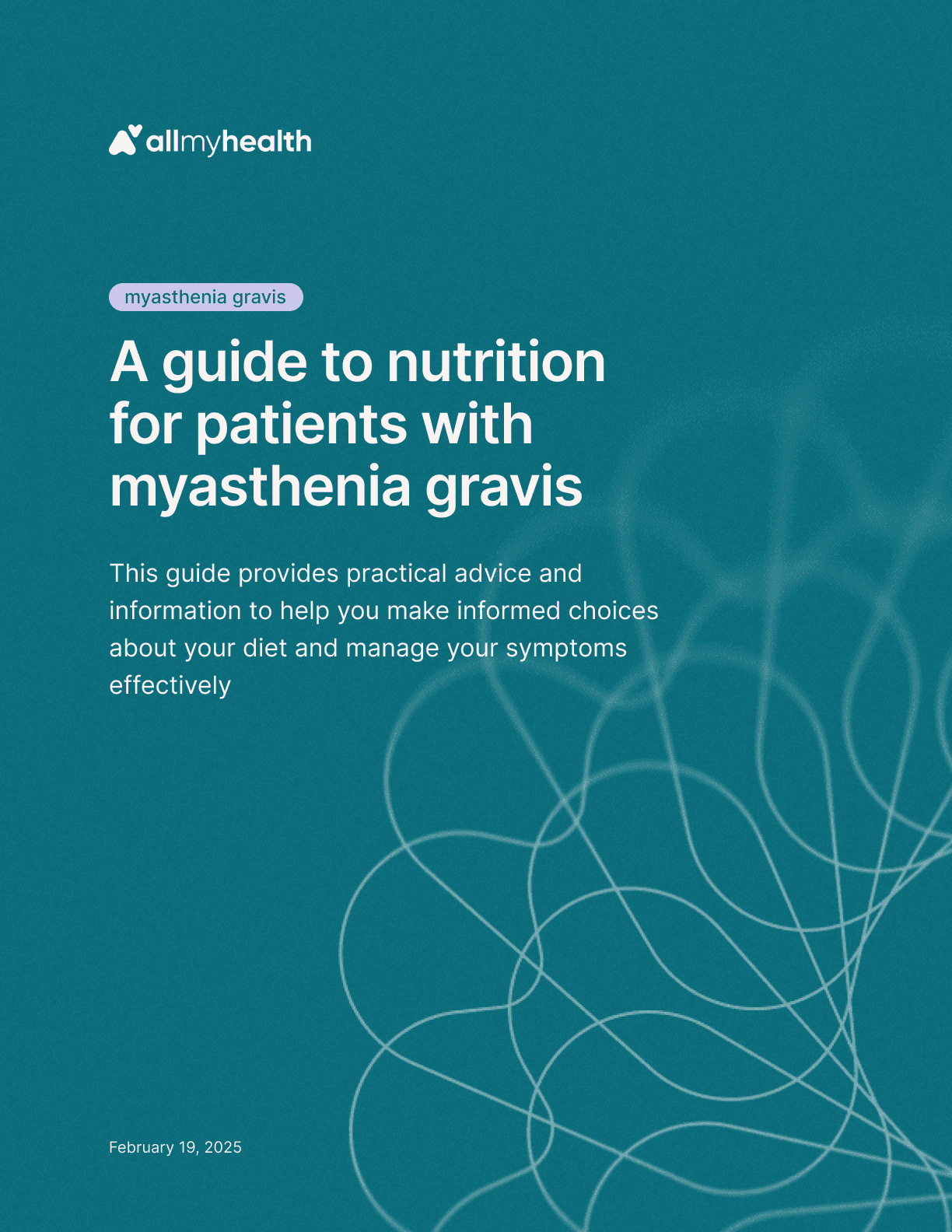
Myasthenia gravis
·
A guide to nutrition for patients with myasthenia gravis
Feb 19, 2025
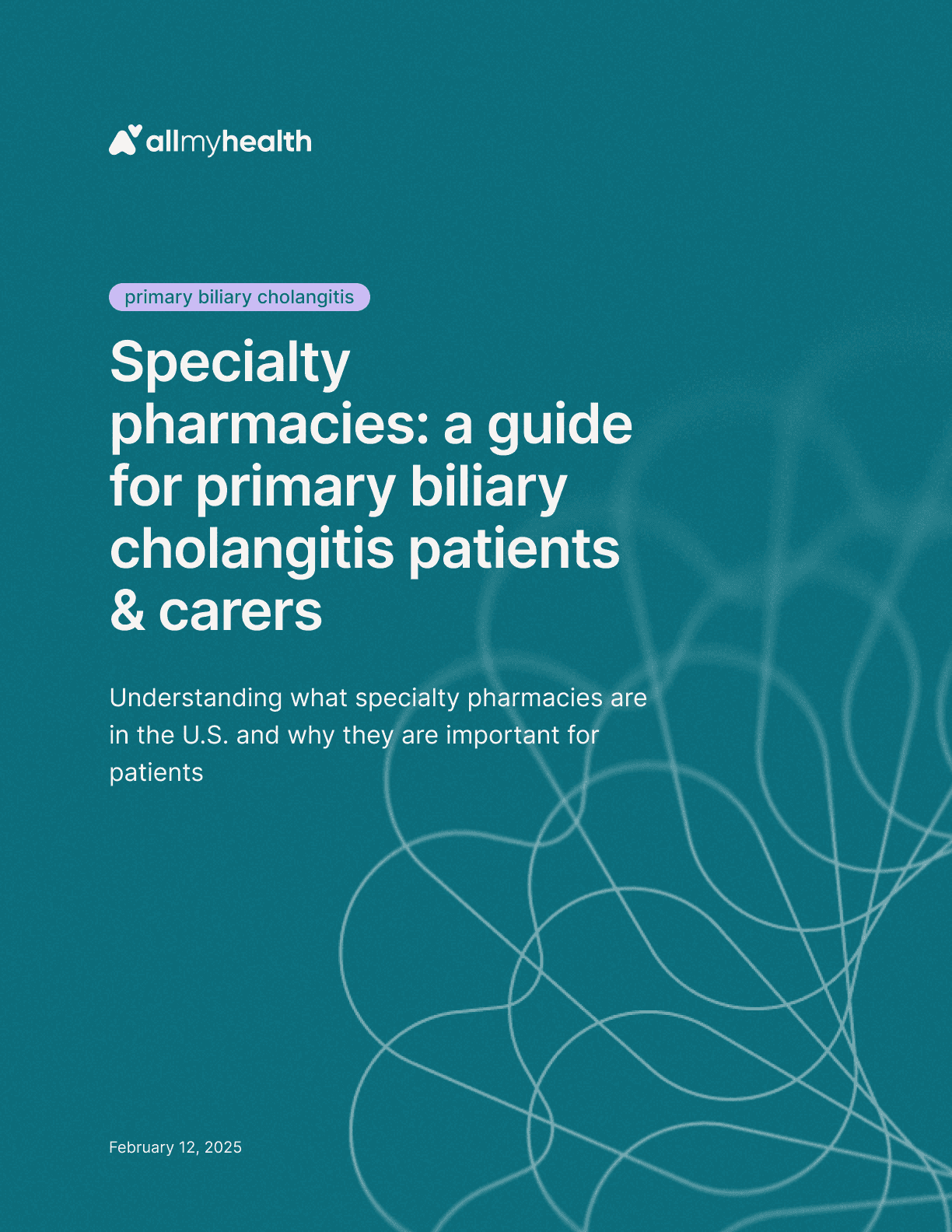
Primary biliary cholangitis
·
Specialty pharmacies: a guide for primary biliary cholangitis patients & carers
Feb 12, 2025
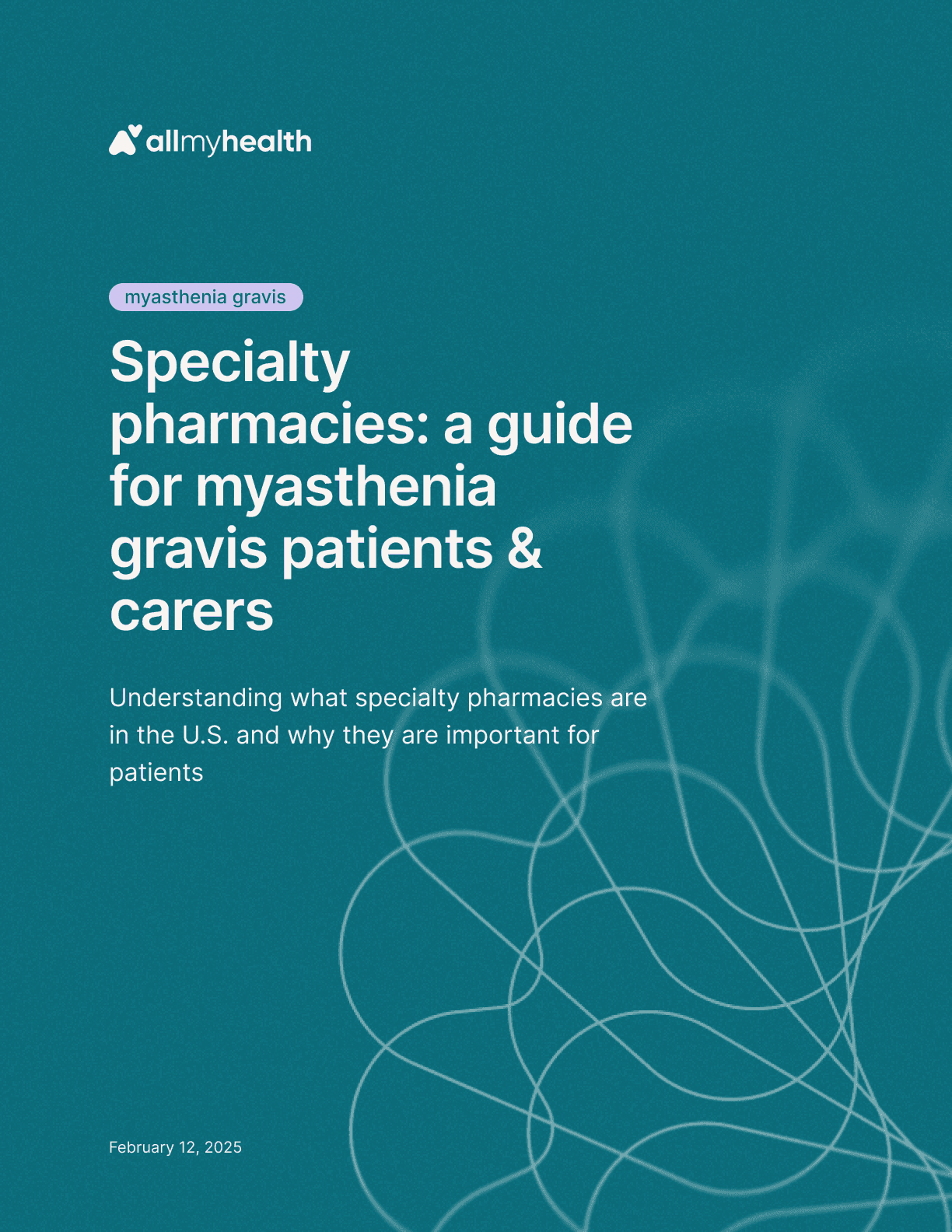
Myasthenia gravis
·
Specialty pharmacies: a guide for myasthenia gravis patients & carers
Feb 12, 2025
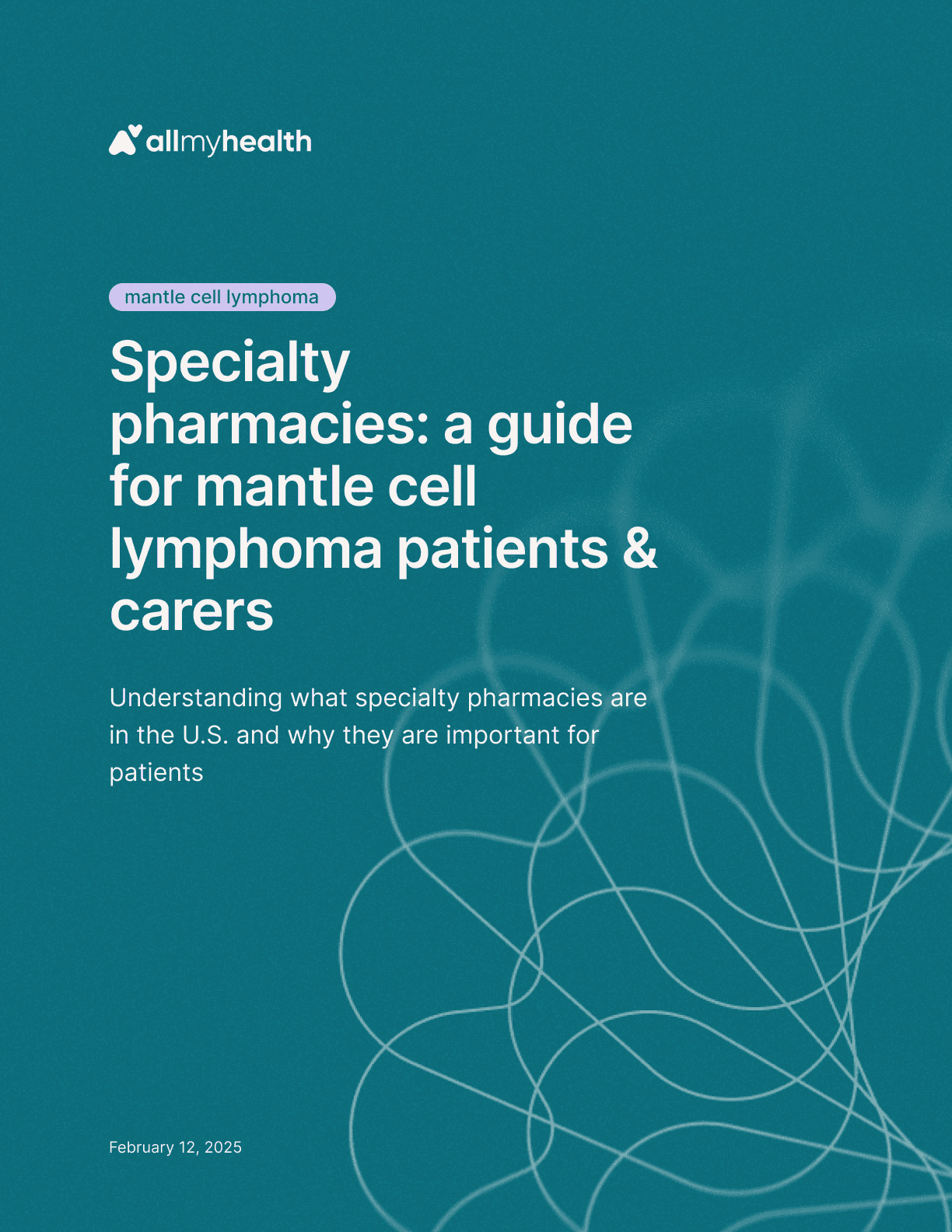
Mantle cell lymphoma
·
Specialty pharmacies: a guide for mantle cell lymphoma patients & carers
Feb 12, 2025
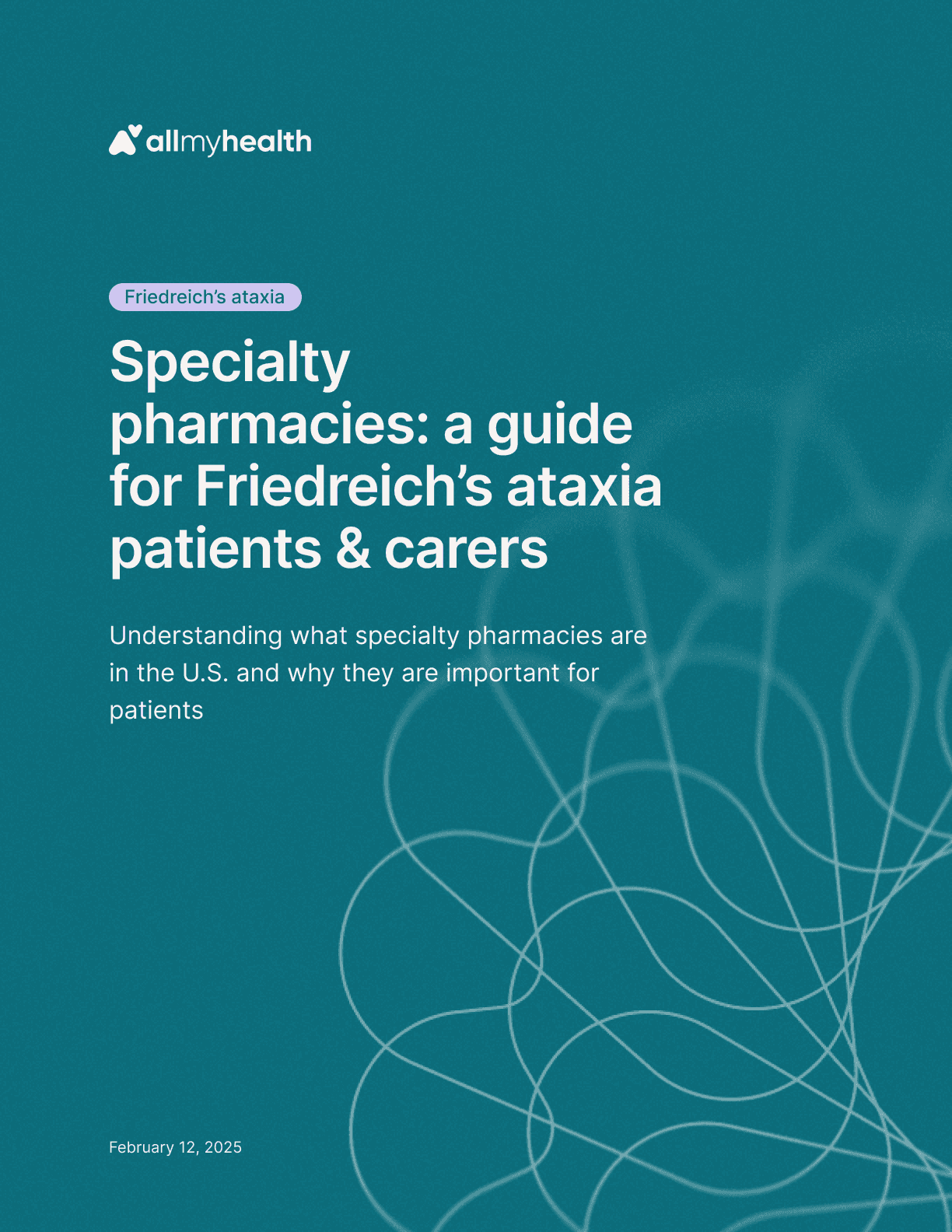
Friedreich's ataxia
·
Specialty pharmacies: a guide for Friedreich’s ataxia patients & carers
Feb 12, 2025
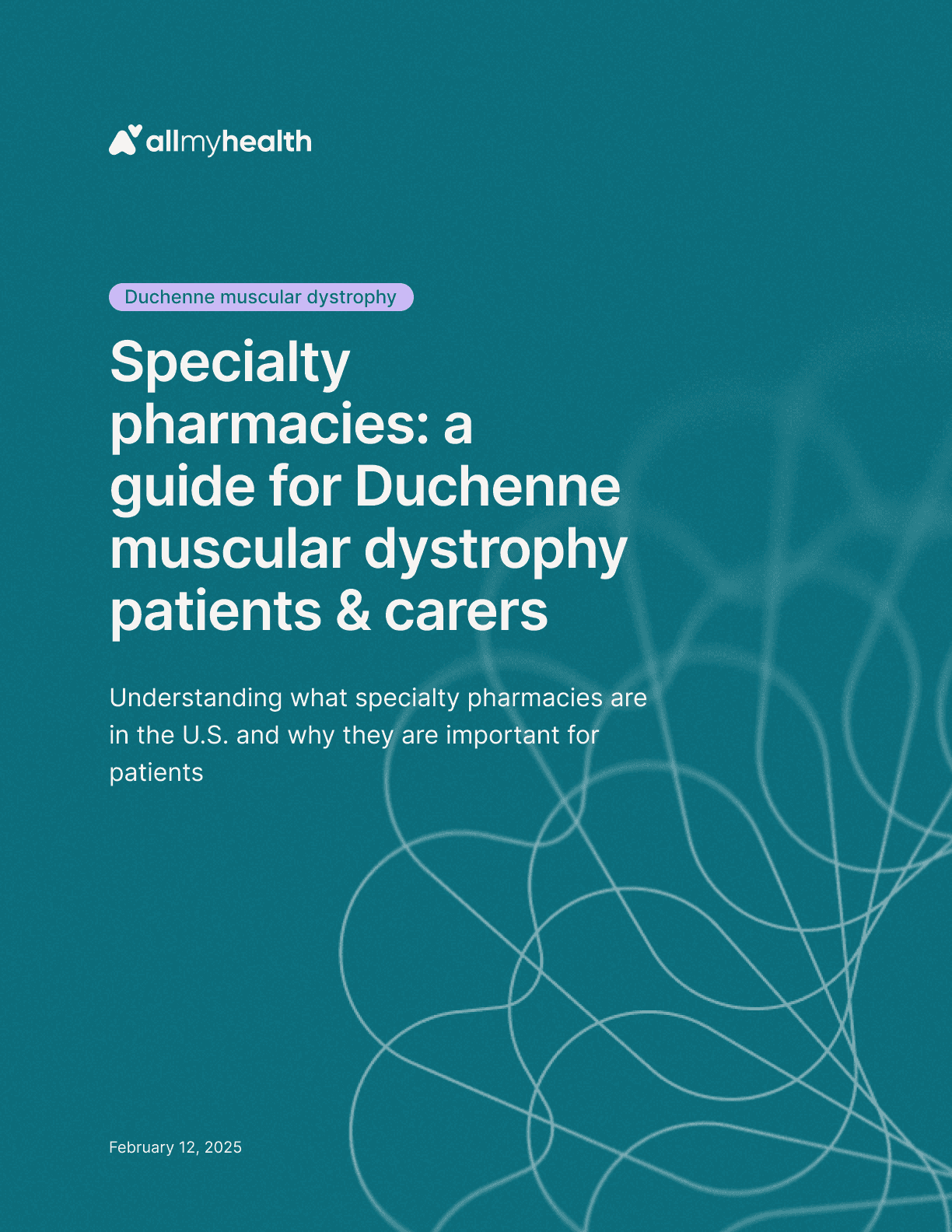
Duchenne muscular dystrophy
·
Specialty pharmacies: a guide for Duchenne muscular dystrophy patients & carers
Feb 12, 2025

Spinal muscular atrophy
·
Specialty pharmacies: a guide for SMA patients & carers
Feb 6, 2025
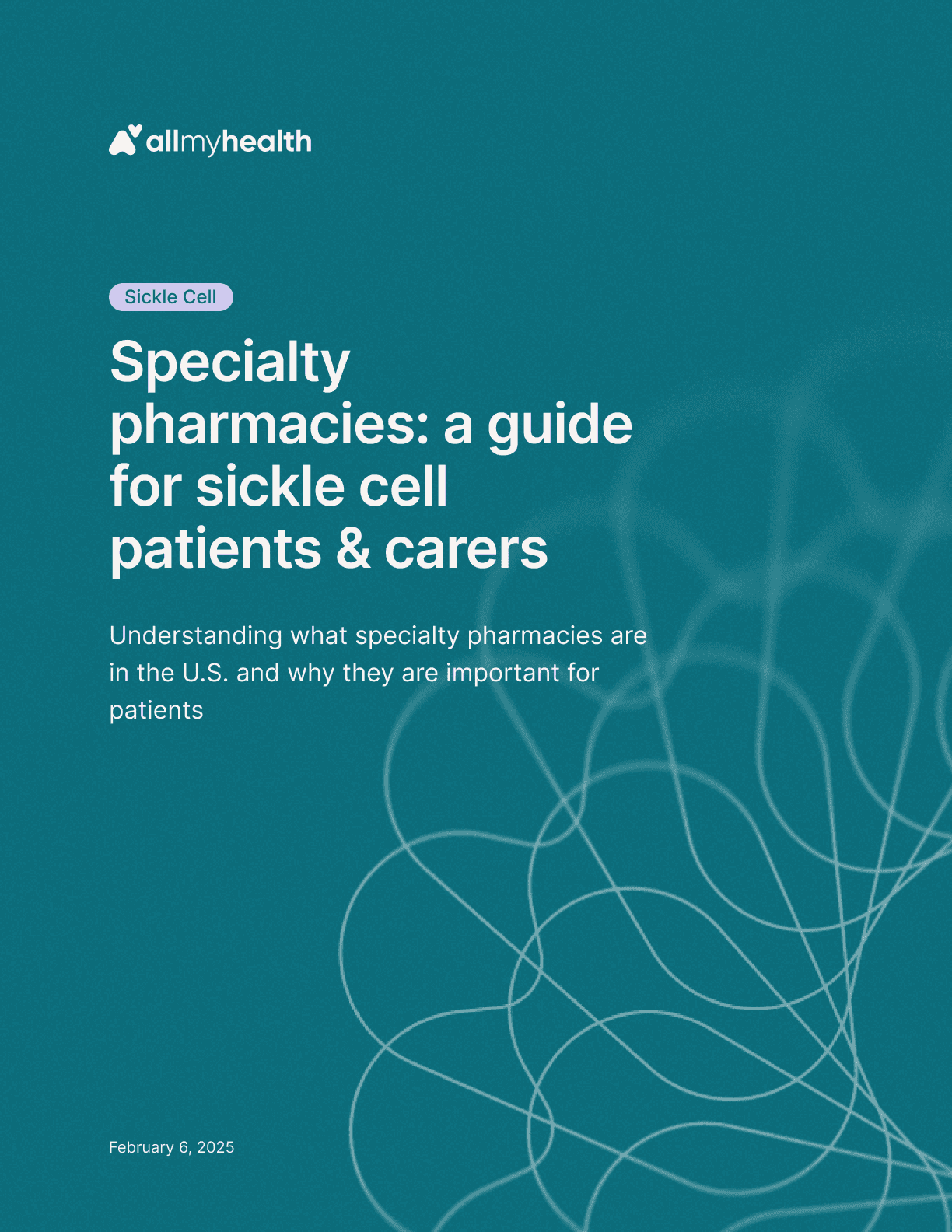
Sickle cell
·
Specialty pharmacies: a guide for sickle cell patients & carers
Feb 6, 2025
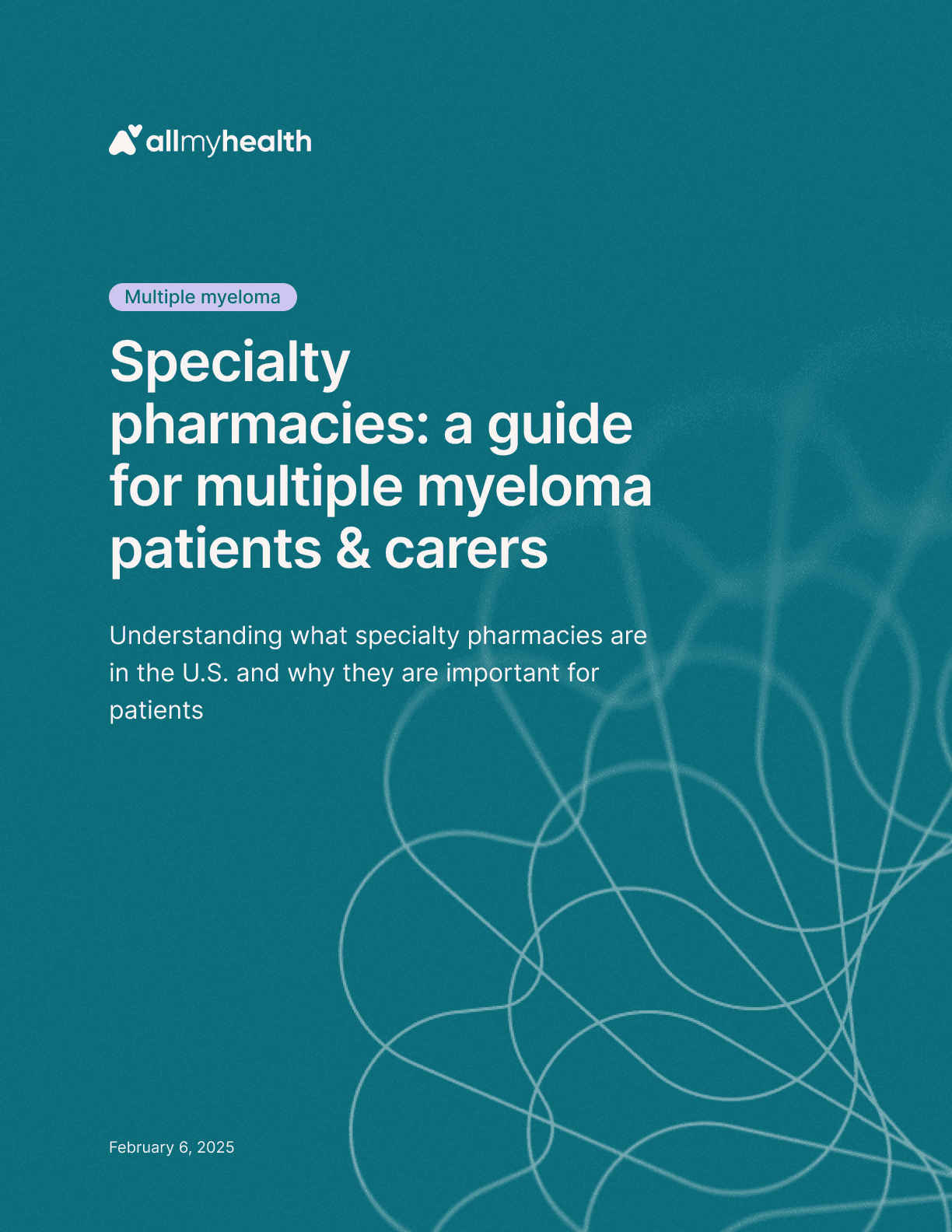
Multiple myeloma
·
Specialty pharmacies: a guide for multiple myeloma patients & carers
Feb 6, 2025
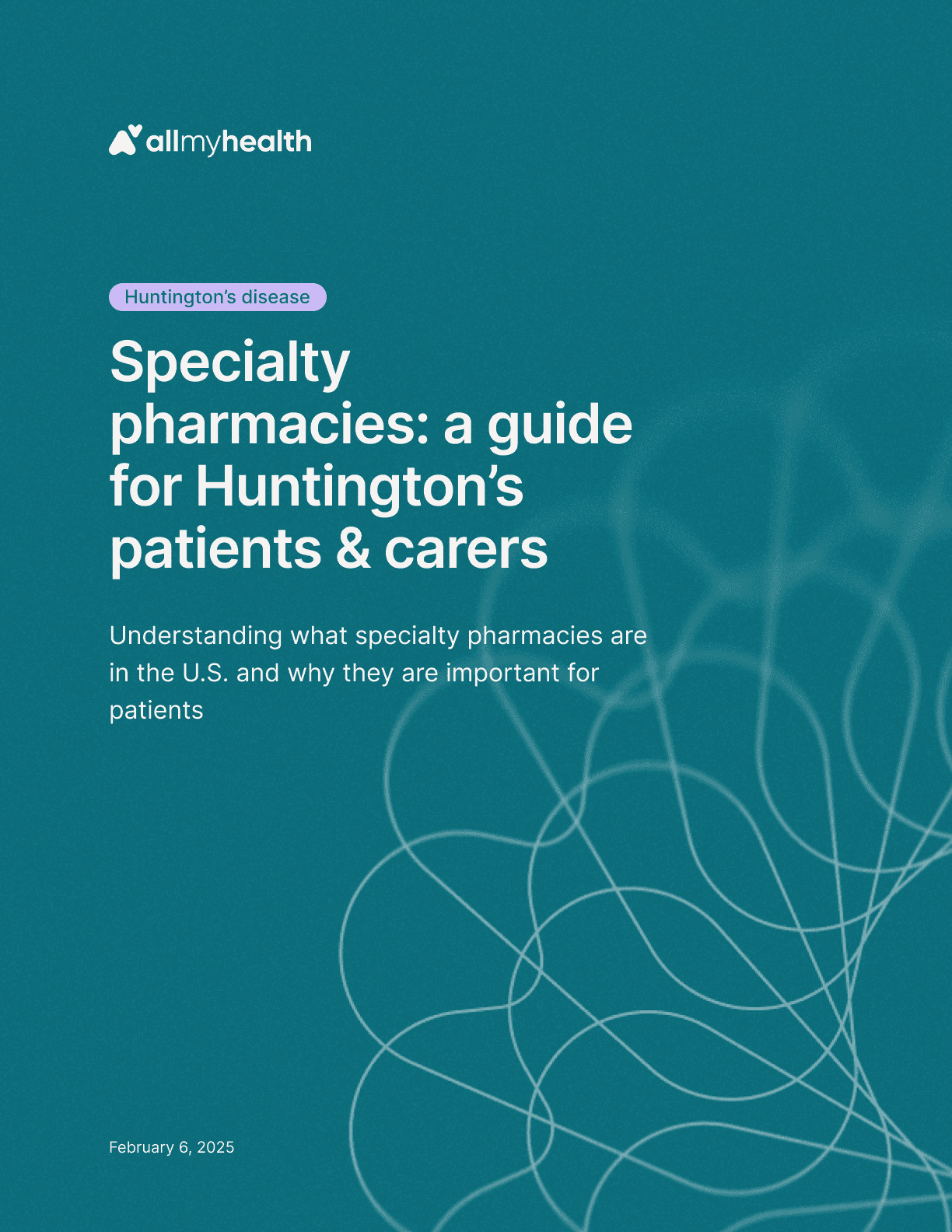
Huntington's disease
·
Specialty pharmacies: a guide for Huntington’s disease patients & carers
Feb 6, 2025
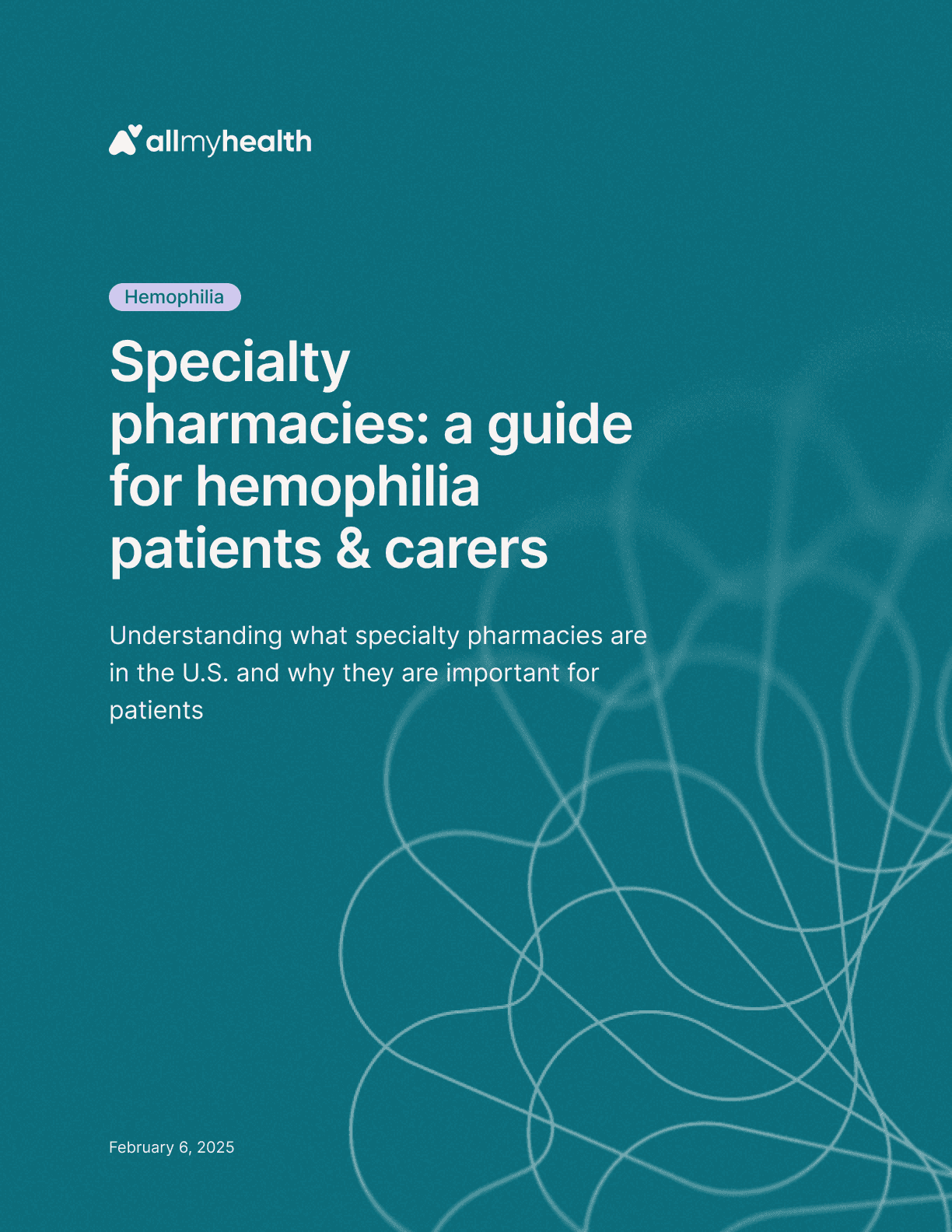
Hemophilia
·
Specialty pharmacies: a guide for hemophilia patients & carers
Feb 6, 2025

Amyotrophic lateral sclerosis
·
Specialty pharmacies: a guide for ALS patients & carers
Feb 6, 2025
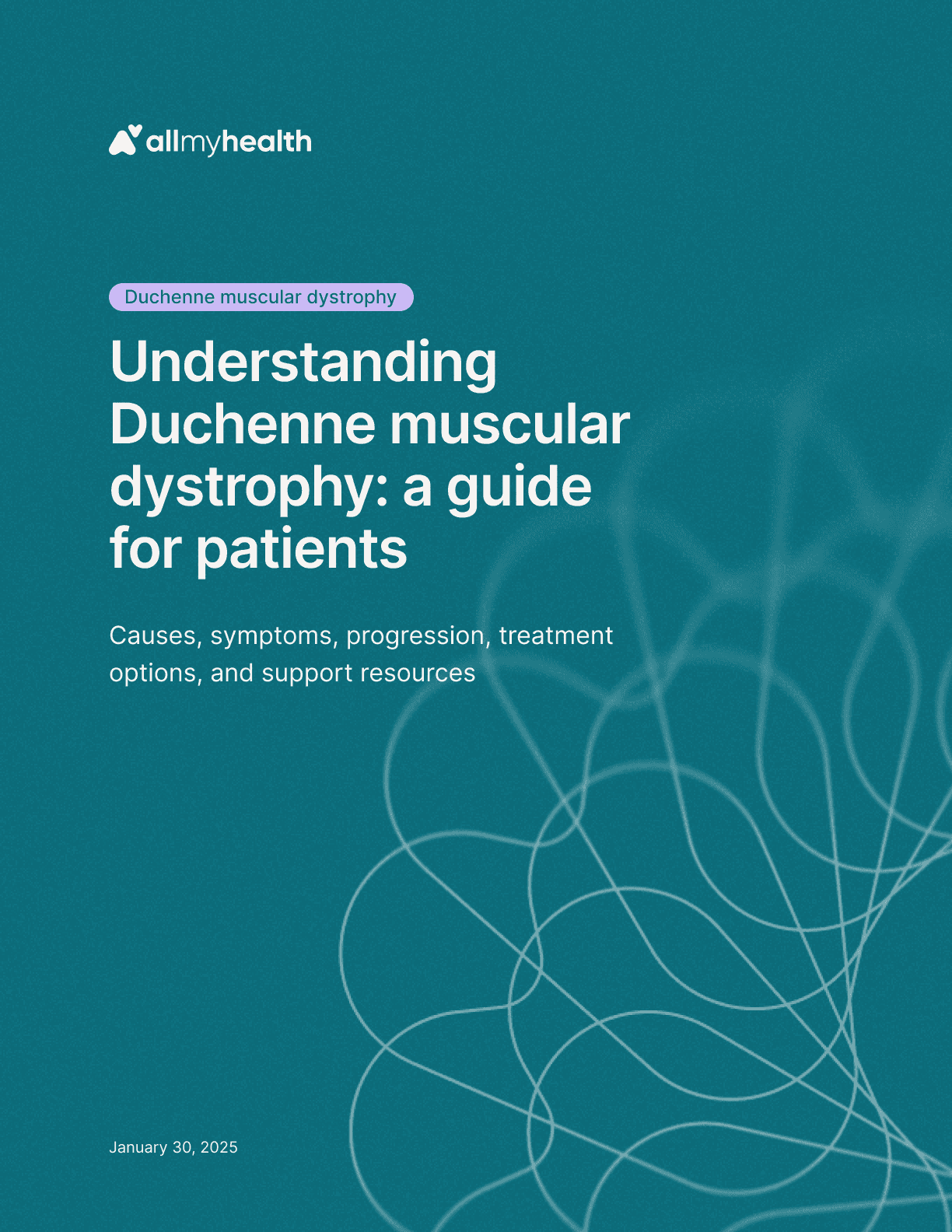
Duchenne muscular dystrophy
·
Understanding Duchenne muscular dystrophy: a guide for patients
Jan 30, 2025
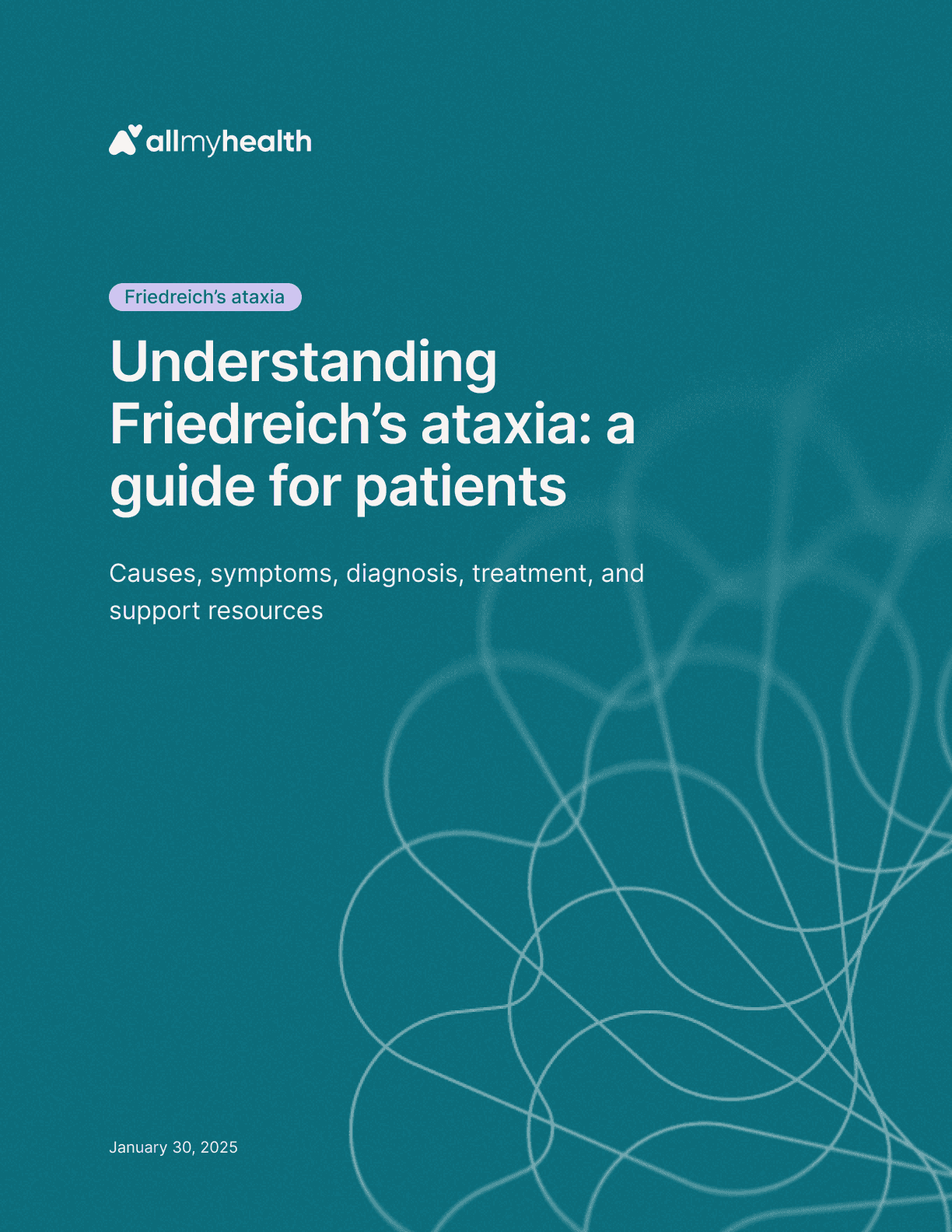
Friedreich's ataxia
·
Understanding Friedreich's ataxia: a guide for patients
Jan 30, 2025

Hemophilia
·
Understanding hemophilia: a guide for patients
Jan 30, 2025
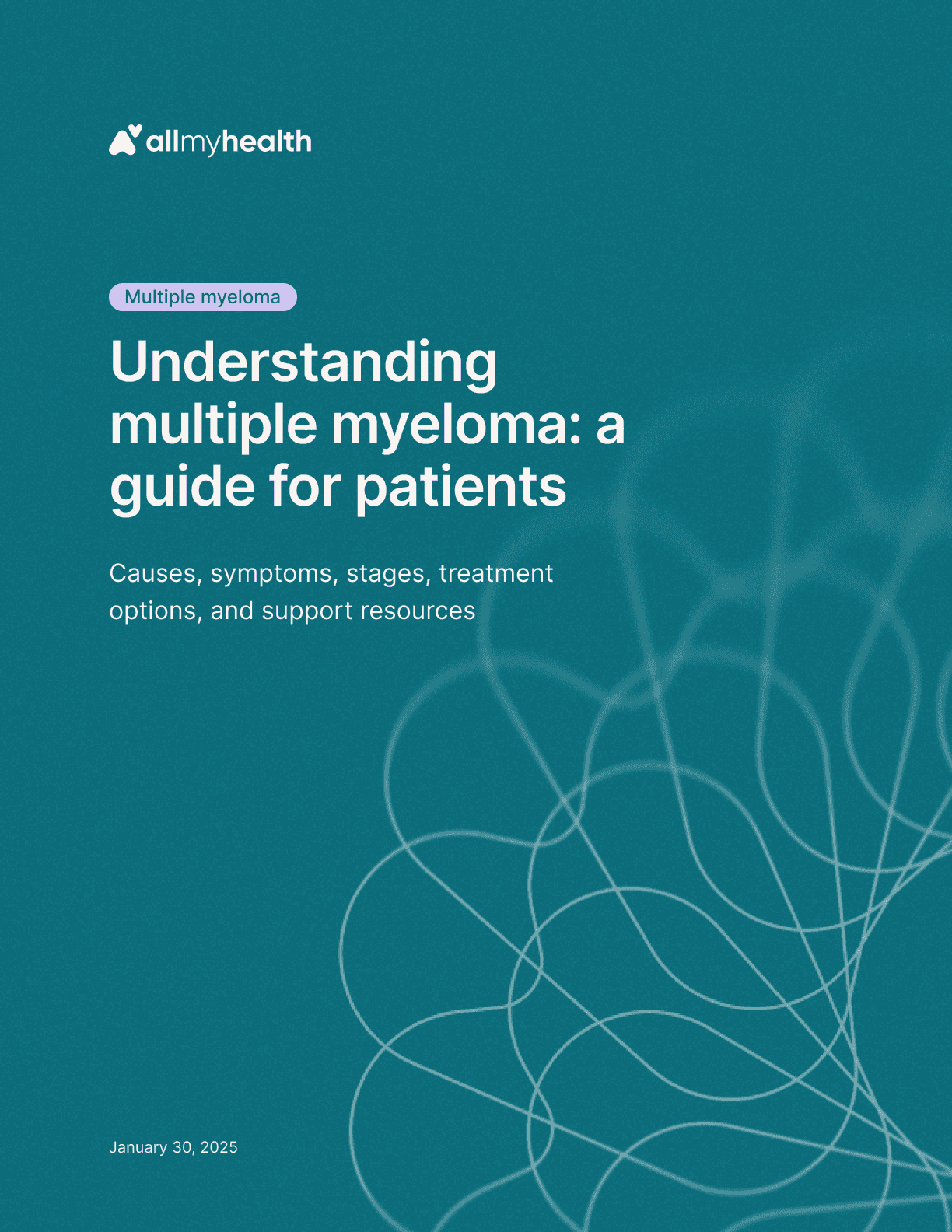
Multiple myeloma
·
Understanding multiple myeloma: a guide for patients
Jan 30, 2025

Primary biliary cholangitis
·
Understanding primary biliary cholangitis: a guide for patients
Jan 30, 2025
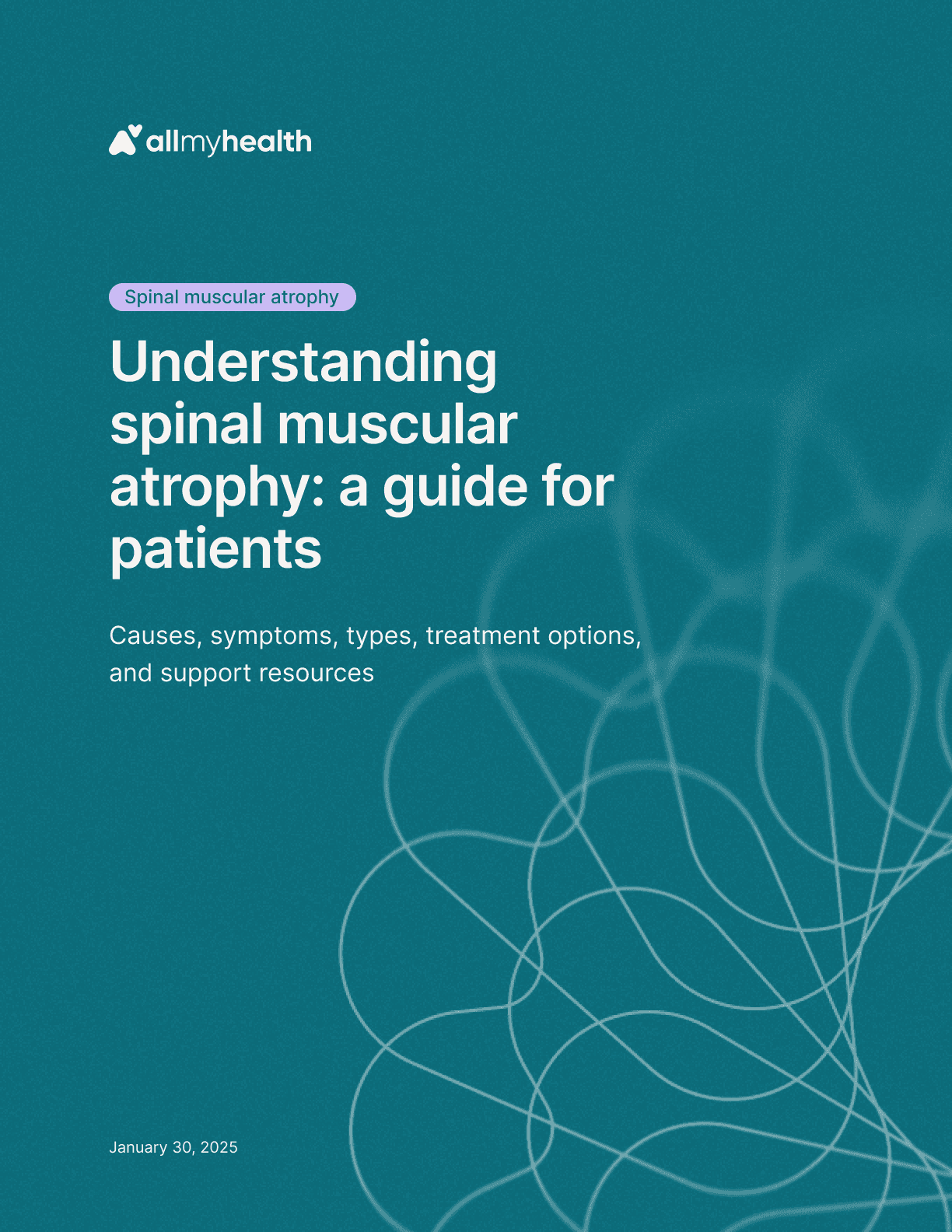
Spinal muscular atrophy
·
Understanding spinal muscular atrophy: a guide for patients
Jan 30, 2025

Amyotrophic lateral sclerosis
·
Understanding amyotrophic lateral sclerosis: a guide for patients
Jan 23, 2025
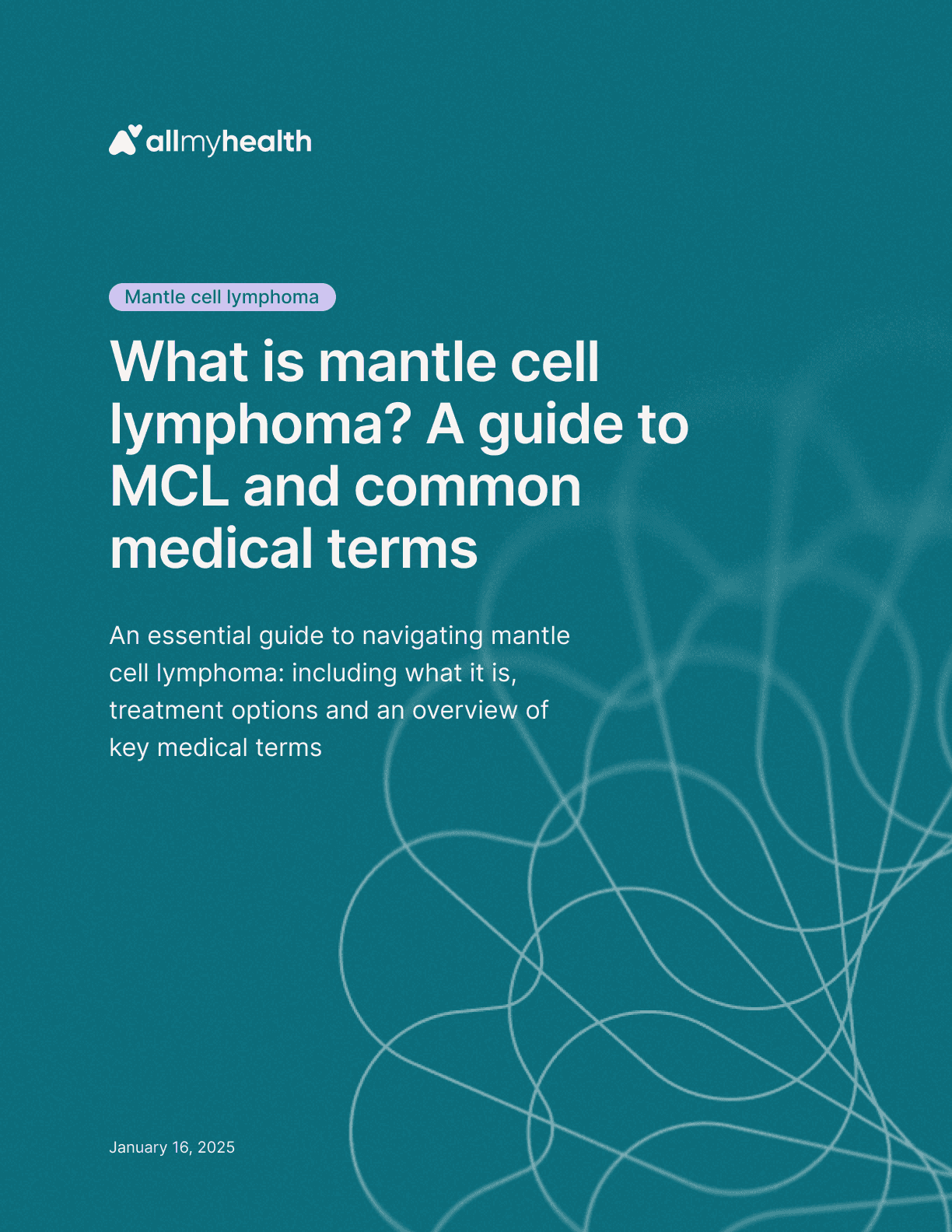
Mantle cell lymphoma
·
What is mantle cell lymphoma? A guide to MCL and common medical terms
Jan 23, 2025
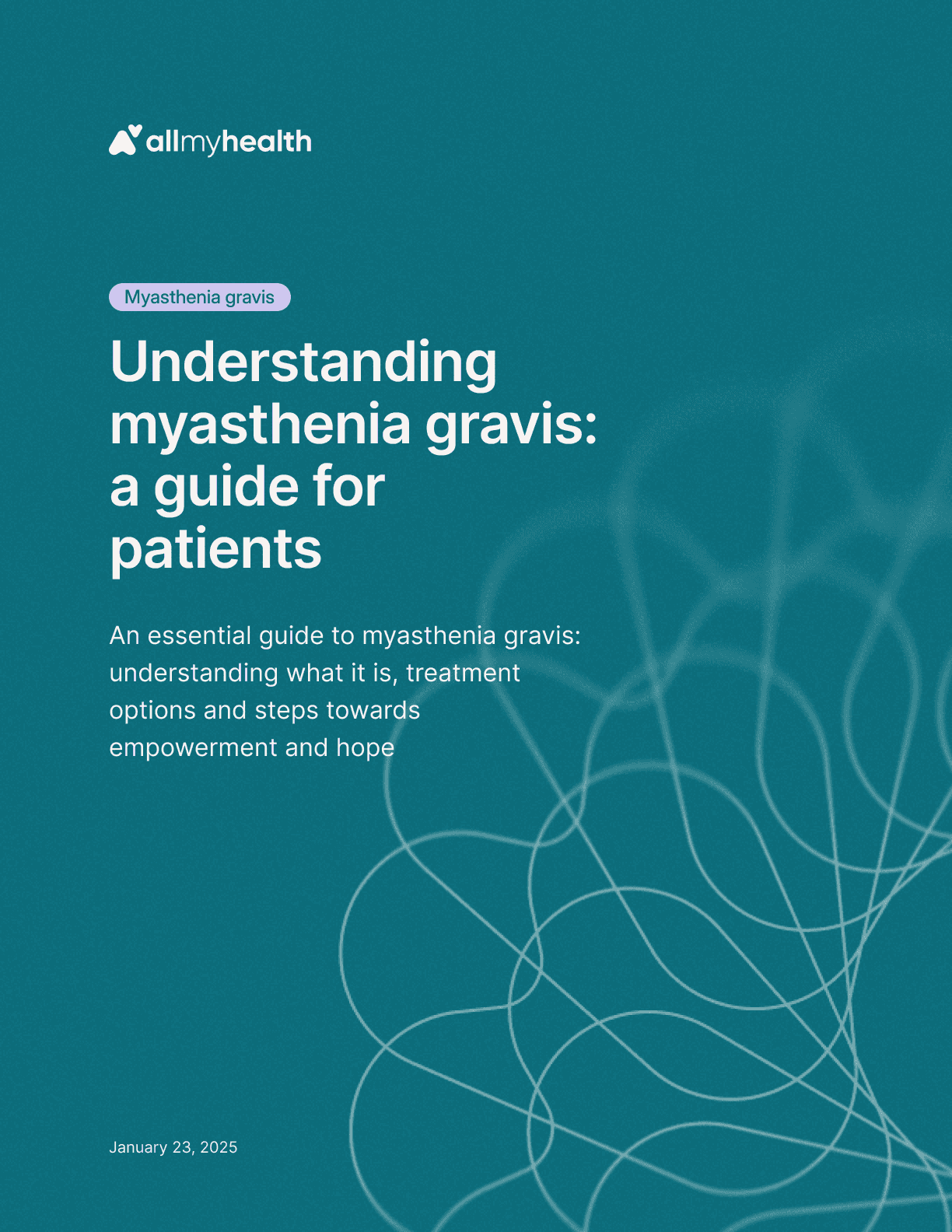
Myasthenia gravis
·
Understanding myasthenia gravis: a guide for patients
Jan 23, 2025
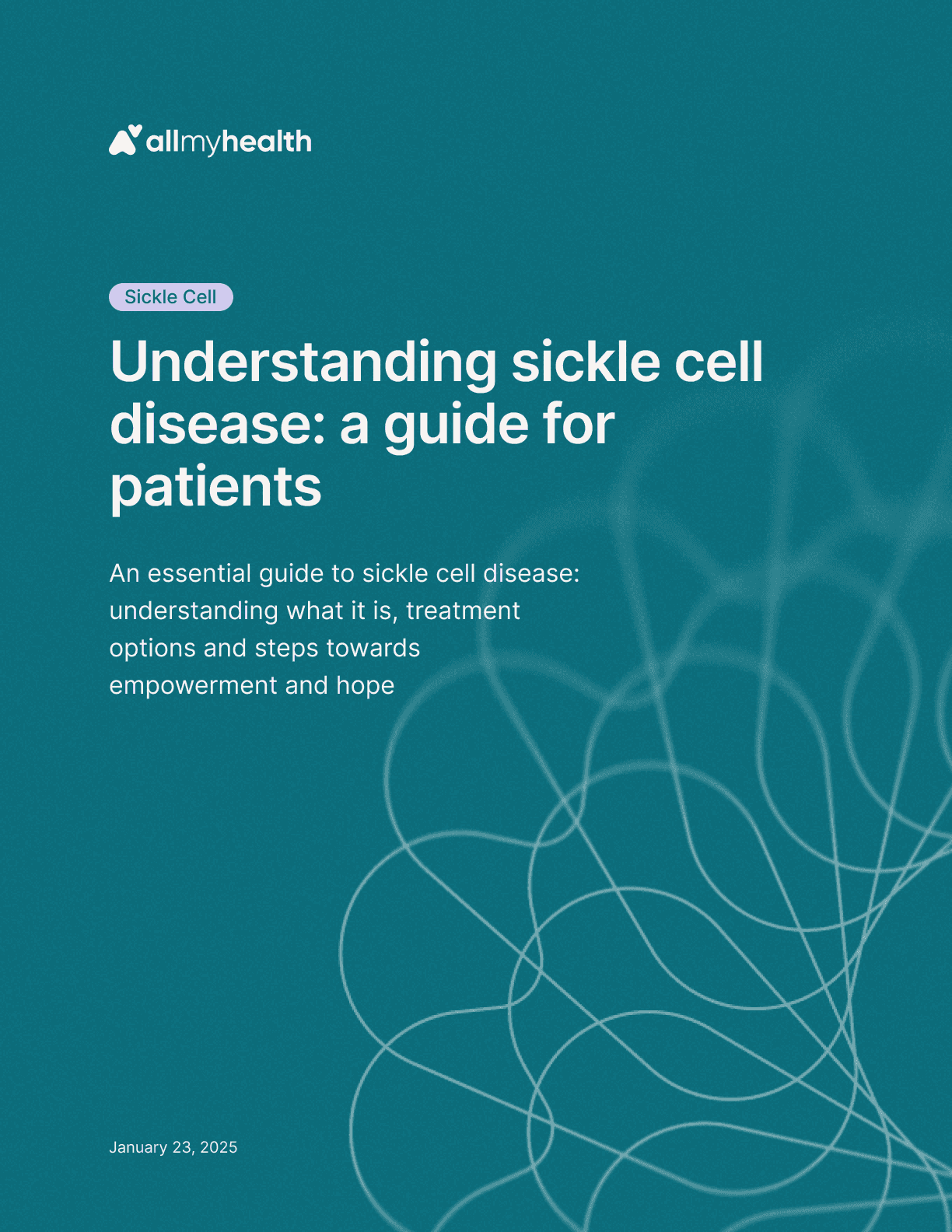
Sickle cell
·
Understanding sickle cell disease: a guide for patients
Jan 23, 2025

Primary biliary cholangitis
·
Exploring financial assistance options for primary biliary cholangitis treatment in the U.S.
Jan 17, 2025
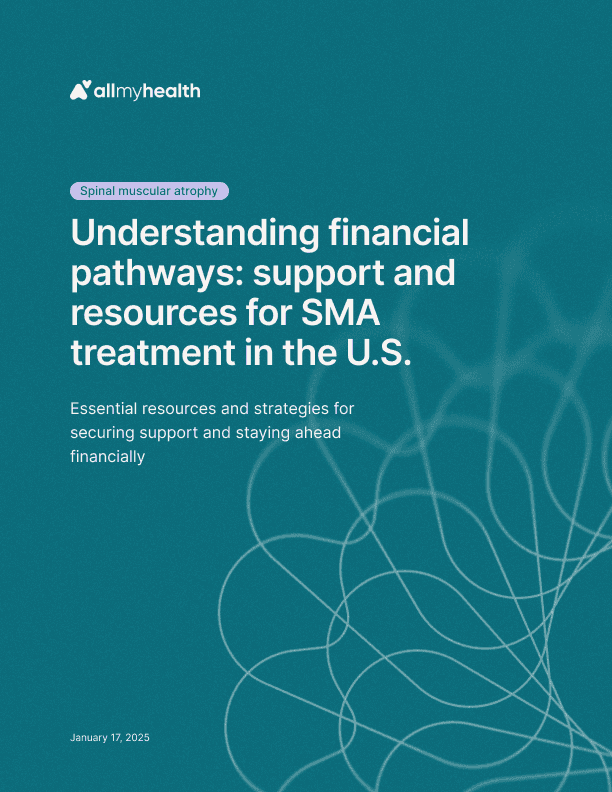
Spinal muscular atrophy
·
Understanding financial pathways: support and resources for SMA treatment in the U.S.
Jan 17, 2025

Duchenne muscular dystrophy
·
Financial strategies for muscular dystrophy in the U.S.
Jan 17, 2025

Hemophilia
·
Navigating financial assistance for hemophilia treatment in the U.S.
Jan 17, 2025
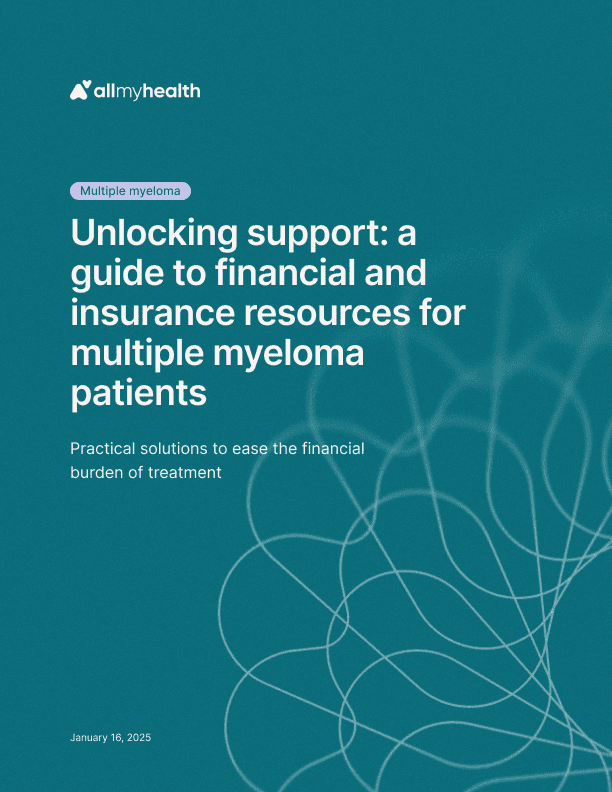
Multiple myeloma
·
Unlocking support: a guide to financial and insurance resources for multiple myeloma patients
Jan 17, 2025

Friedreich's ataxia
·
Navigating Friedreich’s ataxia in the U.S.: a practical guide to support and financial planning
Jan 17, 2025
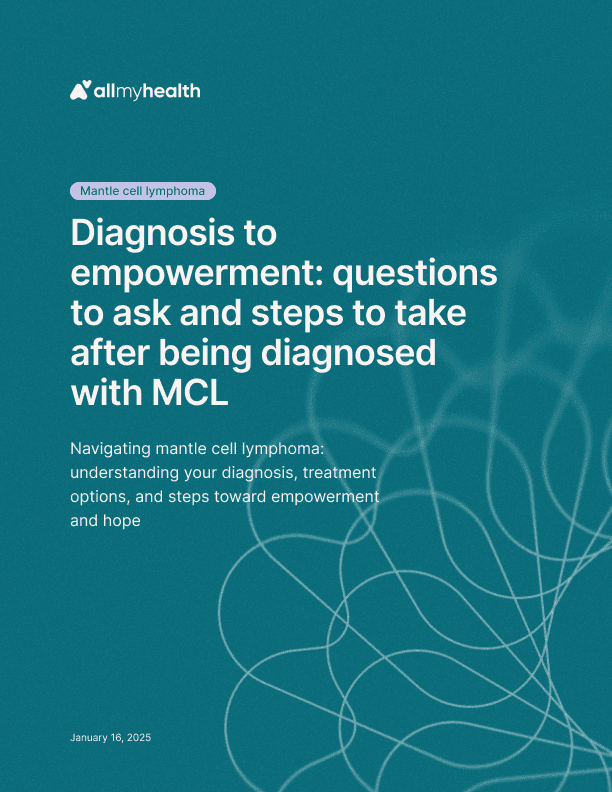
Mantle cell lymphoma
·
Diagnosis to empowerment: questions to ask and steps to take after being diagnosed with MCL
Jan 16, 2025
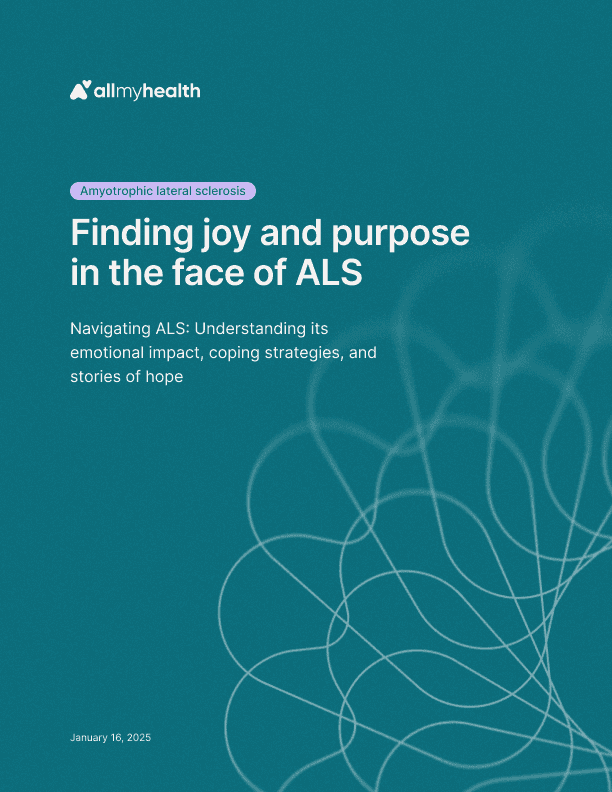
Amyotrophic lateral sclerosis
·
Finding joy and purpose in the face of ALS
Jan 16, 2025
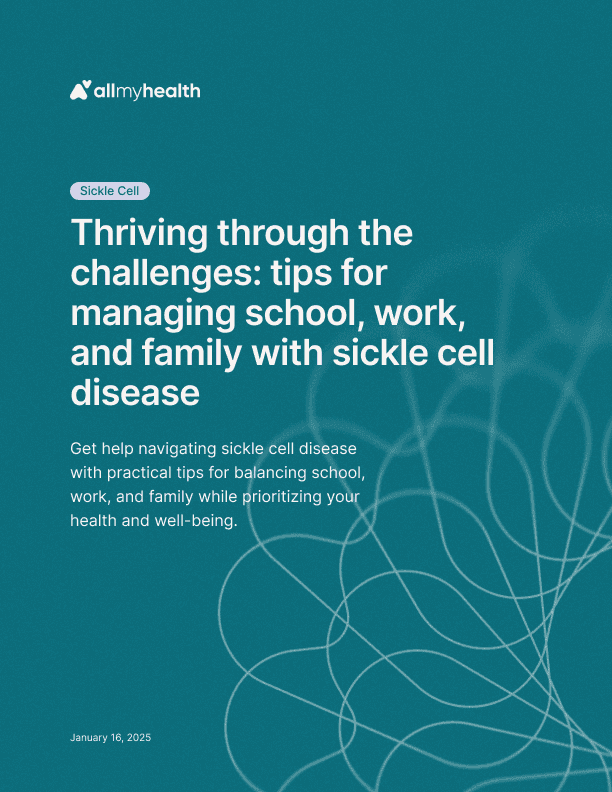
Sickle cell
·
Thriving through the challenges: tips for managing school, work, and family with sickle cell disease
Jan 16, 2025
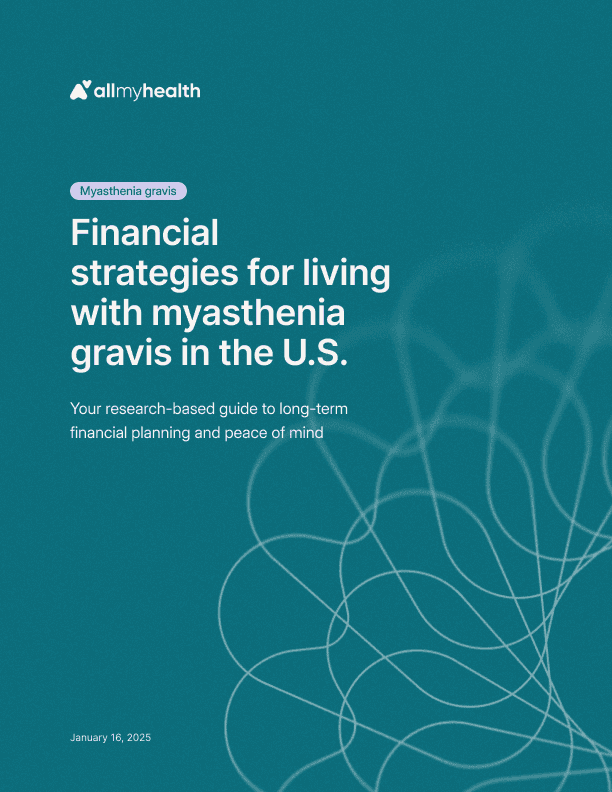
Myasthenia gravis
·
Financial strategies for living with myasthenia gravis in the U.S.: a guide to long-term planning
Jan 16, 2025